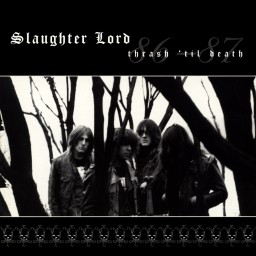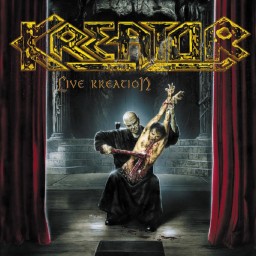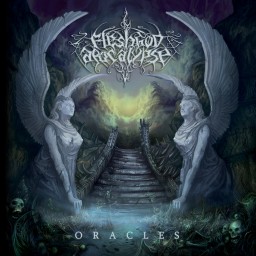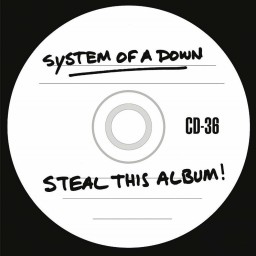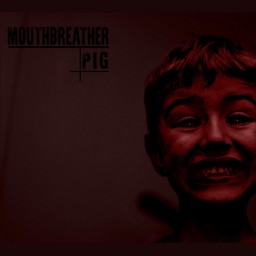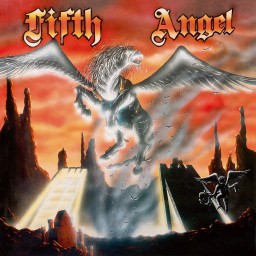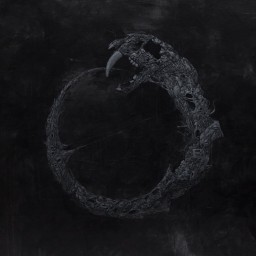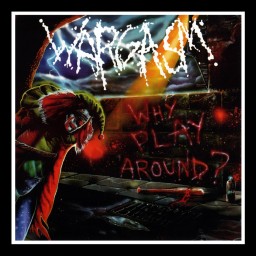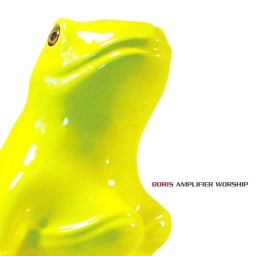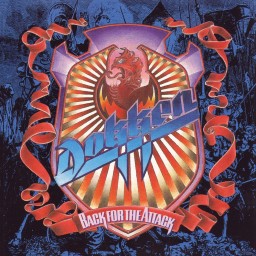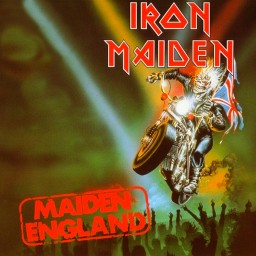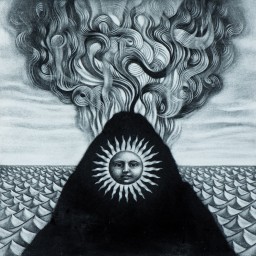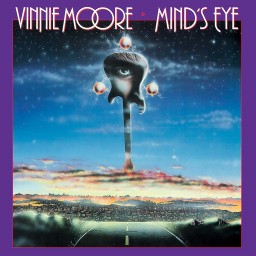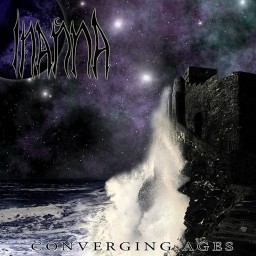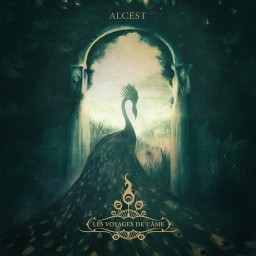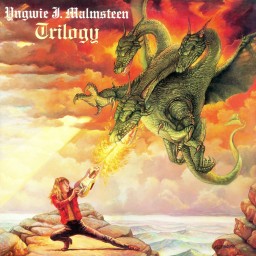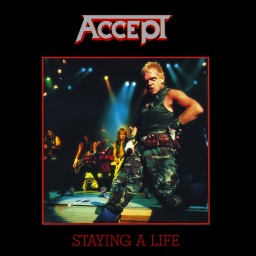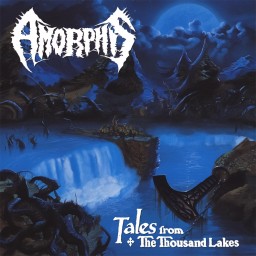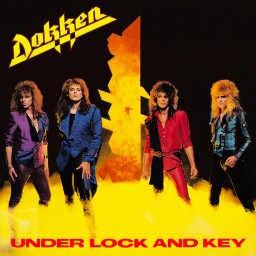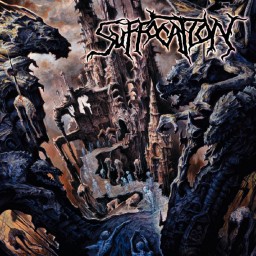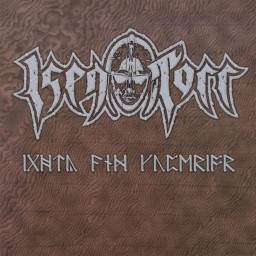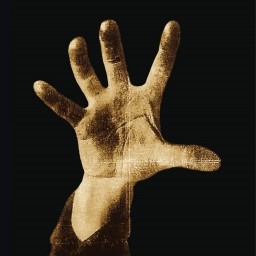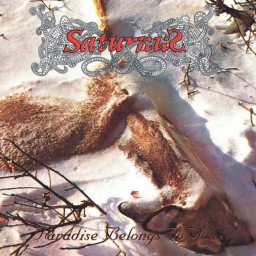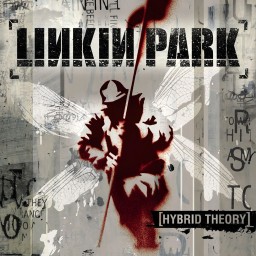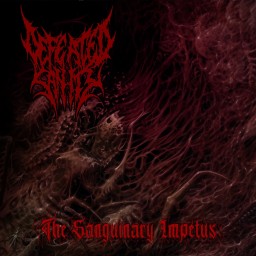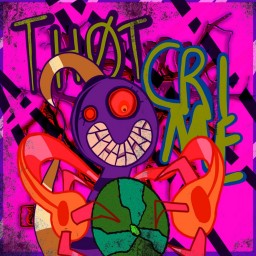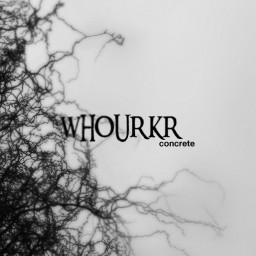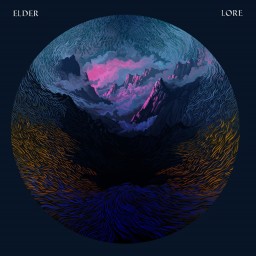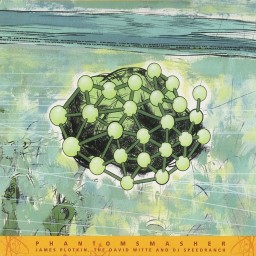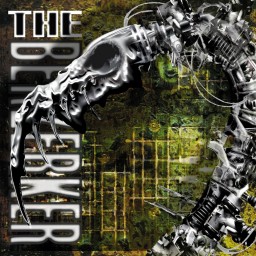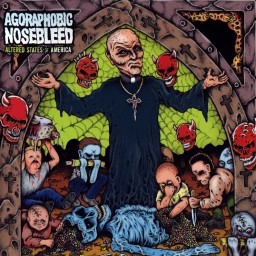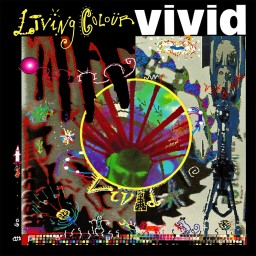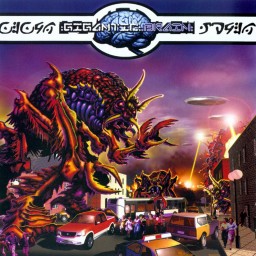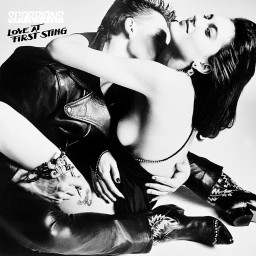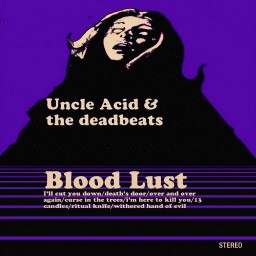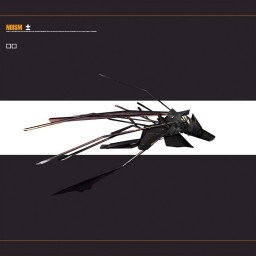Daniel's Reviews
Back in the very late 1980’s & early 1990’s when I first became a part of the underground metal scene there were several local bands that sat beyond reproach as the very pillars with which the Australian metal scene was built on. Given how isolated our country is to the rest of the world (far more so back then), the vast majority of these artists were completely unknown in other parts of the world outside of a select few who were lucky enough to have well-informed contacts down under but the legends of these early metal acts have lived on still to this day. Mid-80’s Sydney extreme metal band Slaughter Lord sit at the very pinnacle of this ideology given that they tick pretty much every box required to ensure maximum notoriety: Only released a demo & some crudely recorded rehearsal tapes? Tick! Provided members to various other important bands? Tick! Had a sound that was ahead of its time? Tick! Were highly influential on some major players in the global metal scene? Tick! That’s right. What we’re talking about here is just as much an enigma as it is an artist selling their wares so it’s worth putting thing into perspective before we move ahead & get all analytical but at the end of the day I believe in reward on merit so there won’t be any free stars being awarded for influence alone from this ol’ metalhead.
Slaughter Lord formed 1985 in the Blue Mountains just outside of the Sydney metropolitan area & their reputation is built on a single poorly-produced three-song demo tape called “Taste of Blood” that was released some time in 1987. I encountered this release very early on in my tape trading days & it certainly got my attention. In fact, I’d suggest that it made a bigger impression on me than Mortal Sin’s legendary 1987 debut album “Mayhemic Destruction” which is saying something for any Sydney-sider. I wouldn’t say that I regard "Taste of Blood"as a classic though as Slaughter Lord still sounded like a work in progress more than a finished product with their sound jumping around a bit & the recording quality & performances still needing a fair bit of work. That didn’t stop “Taste of Blood” from changing to face of metal in ways that very few people are actually aware of though.
In 2000, band leader & drummer Steve Hughes (who is now a world-renowned stand-up comedian) contributed to a project that would see the majority of the Slaughter Lord recordings being re-released on a compilation CD called “Thrash Til Death 86-87” which includes a couple of additional studio tracks & four crude rehearsal recordings of non-demo songs. I hadn’t heard any of that additional material until this week as Slaughter Lord split up a couple of years prior to me first venturing out to my first local metal gig but my interest was certainly high given my familiarity with the demo & the aura of mystery & adoration around the band. I certainly became pretty closely affiliated with the bands that the various band members would go on to play with though & they all command a similar level of respect from myself & my peers. Hughes would do time in Mortal Sin, Sadistik Exekution & Nazxul, founding guitarist Mick Burke would play for Mortal Sin & his accompanying axemen Sandy Vahdanni & Anton Vasquez would both do stints in Sadistik Exekution too so you couldn't wish for a stronger resume than that when it comes to the Sydney extreme metal scene.
"Thrash 'til Death" opens with the two additional studio cuts in “Destructor” & “Slaughter Lord”, both quality tunes in their own right & sounding like they might have been recorded after the demo due to the greater level of sophistication in the composition, performances & production. “Destructor” is a very fast & aggressive thrash metal number that sounds like classic Dark Angel with Mille Petrozza from Kreator behind the mike. I really dig it & it’s one of the highlights of the release. “Slaughter Lord” sounds more like the demo tape with the brutal thrash metal sound being diluted with something more sinister. You see, what made Slaughter Lord so notorious in the global underground was the nastier blast beat-driven death/black metal component. In fact, it baffles me as to why the band aren’t spoken of as one of the founders of the war metal movement because a lot of this stuff is undeniably worthy of that tag with the death & black metal influences being thrown at the listener in a heinous mess of barbaric violence. “Slaughter Lord” isn’t quite as strong as “Destructor” but it’s still a really decent inclusion nonetheless.
“Slaughter Lord” flows nicely into the “Taste of Blood” demo even though the production jobs are vastly different because that war metal component is evident on all three of the demo tracks, particularly the first two. One of the reasons I feel that Slaughter Lord’s sound was still a work in progress though is because the demo tracks all include some pretty standard Slayer/Kreator-worshipping thrash parts & you get the feeling that they hadn’t yet decided on which way they wanted to go, almost like they were still in transition & the next release might be the one that defined them. All three demo tracks are worth listening to though, particularly the title track “Taste of Blood” which is the one that maintains the war metal savagery for the greater majority of its run time. I’ve always wondered how an extreme metal band could manage to release a demo where the guitar tone is lacking in distortion like it is here though, particularly the frantic solos which definitely suffer for it. The vocals are nothing short of savage & sit somewhere between Kreator & Bathory. Hughes’ blast beats are particularly brutal for the time & take their queues from the South Americans as much as they do from grindcore. It’s easy to see the influence that Hughes had on a young Morbid Angel when you look back now & I’d go so far as to suggest that “Altars of Madness” would have sounded a bit different if not for the influence of “Taste of Blood”. The same can be said of Bathory’s classic “Blood Fire Death” album actually as some of the relentless thrash included sounds so similar to the faster thrashers on that particular record & I know that Quorthon was a big fan along with other major players like Sepultura & At The Gates.
The rehearsal recordings are unfortunately where “Thrash Til Death” runs out of steam though. All four are fairly standard thrash tunes that have been recorded poorly & offer nothing additional to the legend the band has created. I do like closer “Cryptic Terror” quite a bit but I struggle to sit through the three that precede it which is ultimately what makes releases like this one more of a novelty than an essential testimonial to an unheralded champion of the global scene. This doesn’t diminish the impact of the “Taste of Blood” demo but it does highlight the fact that Slaughter Lord really built their reputation on a very small body of work & mostly through their own tape trading network (which is kinda cool, isn’t it?). While the band was no doubt a critical player in the Aussie metal scene, I’d suggest that they’re more influential than they are essential but would recommend "Taste of Blood" to anyone that likes the idea of the brutal thrash metal of Necrodeath & Morbid Saint being crossed with the death metal insanity of Sadistik Exekution.
Genres: Thrash Metal
Format: Compilation
Year: 1998
German thrash gods Kreator have been a true enigma in my life since my teenage years & have dominated the other Teutonic thrash heavyweights with great regularity, so much so that if I was to pick my own Big Four of thrash metal they would most certainly be included. Their 1986-1990 era is where it was all at for me personally & I’ve never seen much point in spending a lot of time with the band’s later releases as they’ve inevitably failed to live up to those lofty standards, despite what many diehard thrash aficionados may have you believe. For that reason, the concept of a double live album that comes a good five albums after Kreator’s classic period ended is a recipe that could go either way. A well programmed tracklisting that encompasses the best material from the more recent records combined with a well-placed array of classic era songs could work very well but any prolonged attempt to market the deeper cuts from the less celebrated releases may end up in Snoozeville. Thankfully, Kreator have got the balance just right with 2003’s “Live Kreation” which was compiled from a number of performances across various countries on the tour for 2001’s “Violent Revolution” album.
The most noteworthy element of “Live Kreation” is the production because it’s remarkably & confoundingly good, so much so that I have to question whether producer Andy Sneap has cheated a bit. You see, while Kreator had been one of the top thrash groups for eons by this point, their technical proficiency & perfect precision was never their drawcard. In fact, their general rawness was more the attraction a lot of the time but here we find Kreator functioning like a well-oiled Swiss watch with a wonderful guitar tone & performances that don’t put a foot wrong across the whole 103 minutes. I have to admit that I have serious doubts that front man Mille Petrozza can play this tightly while performing his vocals & thrashing out at the same time. It sounds much more like the two axemen were sitting on stools in a studio completely focused on ensuring that their techniques are spot on & their output is free of the slightest blemish. Regardless of this though, I choose not to dwell on it much as music is music no matter how it’s made & I’ve always appreciated quality production & performances.
Unsurprisingly, the tracklisting is heavily weighted towards the “Violent Revolution” record given that Kreator were touring for that release at the time with the first six tracks from that album appearing here but otherwise it would seem that the band & their management have gone to great lengths to make sure that they included songs from every Kreator album to the time with a good half of the album being sourced from the band’s classic era. The way the 24 tracks have been arranged is excellent as you never have to wait too long for relief if your interest is starting to drift a bit. Personally, I don’t think there’s a weak song on offer but I’d also suggest that the highlights mostly come from the expected inclusions with “Coma Of Souls”, “Terror Zone”, “Betrayer” (my personal favourite) & “Flag Of Hate” leading the way, closely followed by “Pleasure To Kill” & “Under The Guillotine”. Slower doom metal monster “Black Sunrise” is the obvious exception as I found it to be a wonderful inclusion that took me to unexpectedly atmospheric places. It’s rare that the later material is as thrashy or intense as the old favourites though with tracks like “Leave This World Behind” & “Golden Age” venturing right out into traditional heavy metal or even gothic metal territory.
Mille’s vocals are still full of spite as he spits out his lyrics with vitriol. He only goes off course a little when the older stuff gets really fast & intense on a couple of occasions. Drummer Ventor, on the other hand, continues on in the super-efficient, metronomical manner he’s done since 1990’s “Coma of Souls” while new Finnish guitarist Sami Yli-Sirniö nails every run with clear competence. When you take all of this into account, it’s very hard to be critical of such a well-executed, produced & compiled release that’s so chock full of quality. I regard “Live Kreation” as a resounding success for a band that was already well past it’s creative prime & it sits very comfortably alongside similar releases from peers like Sodom, Slayer & Destruction.
Genres: Thrash Metal
Format: Live
Year: 2003
I can still very clearly remember my mindset upon returning to the metal scene in 2009 after a decade of electronic music indulgence. I’d grown tired of the club scene in a similar way to how I’d done with the metal one around 1997/98 & just wanted to hear something genuinely brutal again so my first moves were to see what my beloved brutal death metal subgenre had been up to since I’d last been involved with it which led me very quickly to the Italians who were making the most brutal music the world had ever heard to the time (well… shortly after checking out the latest efforts from old faves like Suffocation & Dying Fetus anyway). One of the releases that particularly blew my socks off was the debut album from Rome’s wonderfully named Fleshgod Apocalypse whose debut full-length “Oracles” offered some of the most relentless music I’d ever encountered, only with a twist or two along the way. Fleshgod Apocalypse would go on to make some fairly significant musical adjustments that would see them becoming more & more of a challenge for me in the years to come but “Oracles” excited me & saw me giving it regular spins every time I needed an adrenaline rush over the next few months. It’s been ages since I’ve listened to it though so let’s see how it’s aged.
Perhaps the biggest feather in the cap of “Oracles” is its presentation. I simply adore the cover artwork which utilizes a striking colour scheme to enhance an already attractive image. The production job is equally impressive though, perhaps even more so given just how hard it must have been to achieve this sort of clarity amidst some of the most relentless blasting you’ll ever encounter. Sure, bassist Paolo Rossi isn’t done any favours by the mix which is hardly unusual for a death metal release but the guitars are presented with supreme precision. Legendary extreme metal drummer Mauro Mercurio’s drums are certainly heavily triggered & do sound a obviously artificial when isolated in the mix but it works well for a release that’s as technically demanding & high paced as this one is.
Some of you would likely be aware of Fleshgod Apocalypse through their bombastic symphonic death metal releases from the 2010’s, particularly their popular 2011 sophomore album “Agony” (which time has seen me quite liking after overcoming some initial concerns) but the band kicked off their recording career with a couple of releases that sound a little more traditional & can now be seen as somewhat transitional even though they were Fleshgod Apocalypse’s first proper releases. What we receive from their initial effort is an extremely brutal & extraordinarily relentless release that keeps a foot in both the technical death metal & brutal death metal camps in a similar way to bands like Hour of Penance, Nile or Origin while also throwing around some neoclassical influences without fully taking the plunge like they’d do over the next couple of years. There’s not anything especially symphonic in Fleshgod Apocalypse’s metal material at this stage in their evolution but there’s definitely some attempts to use classical music as a compositional tool from the guitarists with the solos being entirely neoclassically focused. There are also four or five quite accomplished classical interludes positioned at key locations within the tracklisting & these serve a very definite purpose given the aural battery the listener is subjected to via the metal material.
So how does it all work? Well, I’m a big fan of well executed brutal death metal so I find the flat-chat, pedal-to-the-metal stuff to be nothing short of exhilarating. Hired gun Mercurio (Hour of Penance/Hideous Divinity) is unbelievably fast & his endurance is almost super-human so for someone that’s obsessed with elite-level extreme drumming “Oracles” almost falls into the novelty category (although admittedly band leader Francesco Pauli would one-up him on the next album with arguably some of the most savagely brutal drumming ever recorded). The limiting factor here though is that I find neoclassical guitar work to be at odds with the intended aura of the death metal sound. There’s just something that doesn’t sit all that comfortably with me which sees most tracks including parts that aren’t exactly as I would wish. Still, there’s a lot to love about “Oracles” with Pauli’s crushing death growls & precision riffage being combined with Mercurio’s mind-blowing fury to create some of death metal’s most over the top material.
Fleshgod Apocalypse would push the neoclassicisms one step further on their 2010 “Mafia” E.P. before cruising head-first into symphonic territory for 2011’s “Agony” sophomore album & have never looked back. Personally though, I still find this debut album to be the most appealing inclusion in the band’s back catalogue & it’s always serves me very well indeed when I’m looking for the ultimate dose of adrenaline-fueled intensity.
Genres: Death Metal
Format: Album
Year: 2009
When I first made the decision to fill in the gaps in my understanding of Californian alternative metallers System of a Down’s widely respected back catalogue a couple of months ago, I think I subconsciously expected each release to sound drastically different from each of the other four. I mean, I’d found SOTD’s two strongest album’s (2001’s “Toxicity” & 2005’s “Mezmerize”) to sound so fresh & original when I first encountered them with the band’s quirky, avant-garde edge not sounding much like anyone else at the time so it was the obvious assumption given how wacky & infectious some of their musical excursions tend to be. It never occurred to me that SOTD could fall into some kind of comfortable groove that would see each album sounding relatively similar but that seems to be the way the chips have fallen to an extent. Don’t get me wrong, they’re such a talented bunch of musicians that they’ve never really come close to releasing anything subpar but neither have the three remaining albums lived up to the expectations set by my first SOTD experiences.
Anyway, that being said, 2002’s “Steal This Album!” record is the last of System of a Down’s five full-lengths that I’ve chosen to explore & it could be forgiven for sounding relatively similar to 2001’s “Toxicity” given the circumstances around the release. The material included on “Steal This Album!” is essentially a bunch of leftovers from the “Toxicity” sessions that originally saw the light of day through unofficial means when rough demo versions of the songs hit the internet under the “Toxicity II” title. This apparently disappointed the band enough to see them quickly engaging producer Rick Rubin to produce an official release that includes a full sixteen tracks that the band have always maintained are of a similar quality to “Toxicity” but didn’t quite fit the concept for that album. Given that information, it’s really pretty impressive that SOAD have delivered a record that can stand on its own two feet alongside the band’s other full-lengths.
Unsurprisingly, “Steal This Album!” sounds a little less cohesive than the System of a Down's stronger records & the inclusion of a full sixteen tracks seems a touch ambitious in all honesty. A little trimming wouldn’t have gone astray here & could have led to a more consistent product in my opinion. The tracklisting starts off brilliantly with two of the best & most memorable songs on the record before continuing at a reasonable level of quality for the remainder of the A side. Things start to get a bit shaky from track nine though with three or four filler songs being tossed out in relatively quick succession before things are rapidly resurrected at the end with the other two best inclusions closing out the album. I tend to get a touch lost during weaker material like “36”, “Pictures”, F**k The System” & “Ego Brain” to tell you the truth so it takes me looking at the album holistically for me to get an accurate gauge on my feelings.
I’d suggest that “Steal This Album!” is a slightly less intense record than some of System of a Down’s other works with full throttle opener “Chic ‘n’ Stu” being the obvious banger. There are a few more stripped back numbers included (like the excellent acoustic number “Roulette”) & it’s easy to see how those particular songs may not have fit into “Toxicity” as a creative statement, despite still being strong material. The band sound as tight & talented as ever here so, even though I’d suggest that this is the least impressive of System of a Down’s five albums, it’s not far behind the self-titled & “Hypnotize” in terms of general quality & easily keeps the Faith No More’s & Dir en Grey’s of the alternative metal world on their toes.
Genres: Alternative Metal
Format: Album
Year: 2002
I’ve found my taste profile to be increasingly open to The Revolution in recent years but it tends to be only certain pockets that really float my boat with others leaving me a bit flat. Clearly the most appealing style of metalcore for me though is the more chaotic & extreme forms of mathcore, particularly when combined with sludge metal &/or grindcore. I’ve been known to seek out releases that fall into that bracket occasionally in order to satisfy my itch for those sounds & Mouthbreather’s “Pig” appeared to be a very promising prospect based on the information I was reading online with reviews being generally very positive & the grindcore genre receiving regular mentions as an influence so I was pretty confident of finding another off-the-hook addition to my small list of short & psychotic balls of energy.
Interestingly though, the very short seven minute “Pig” E.P. isn’t exactly what I thought it would be. For starters, it’s far from the most technical of mathcore releases. In fact, I’d suggest that it falls somewhere in between mathcore & traditional metalcore even though it’s quite a noisy & chaotic release. It’s structures just aren’t that rhythmically complex & the links to the mathy end of the genre tend to come more from the unusual use of guitar noise which is a feature of the record. Where is the grindcore that people have been referencing though? I can only identify about 30 seconds of grind influence across the whole seven tracks to be honest which left me a touch disappointed given my strong affiliation with The Horde. I can only guess that it’s the very short track lengths that are prompting people to make that link but let's not forget that short track lengths are par for the course in purist hardcore circles.
Anthony Santagati’s over-the-top vocals fall well within the confines of the metalcore spectrum & he does a reasonably good job as he spits his words out with undeniable spite & vitriol. The use of metalcore breakdowns is quite prominent too with the occasional use of gravity drops also being employed to provide a little more oomph. Both of those elements see Mouthbreather losing a little steam for me personally as they start to angle them back towards the masses when they don’t actually sound all that generic. “Ryan Goes To Rehab” is more of a short sludge metal piece which appears to have been included in order to break up the relentless barrage of metallic hardcore aggression. I think it’s fit for purpose too but the same can’t be said for closing sound collage piece “Religion & Tonic” which sees the E.P. petering out in a whimper & is one of the deciding factors in “Pig” missing out on a pass mark from me when you consider that it’s also one of the longer inclusions in the tracklisting. The other main detractor is the noticeable lack of highlights with all six of the metal-based tracks being quite good but none of them ever really threatening to reach a solid 4/5 score. When your closer is as poor as this one then you really need at least a couple of truly great tracks to balance it out but unfortunately that’s not the case here.
I’ve been a little disappointed with “Pig” to be honest as I was expecting more given how highly regarded it seems to be. Bands like Gaza, War From A Harlot’s Mouth & Inside The Beehive do this extreme brand of mathcore much better than this in my opinion & I’d recommend that you explore those artists before venturing towards Mouthbreather. Then again, the seven minute run time hardly requires much investment now, does it?
Genres: Metalcore
Format: EP
Year: 2017
A privileged few of you may be aware of The Black Twilight Circle, a mysterious group of black metal producers from California who collaboratively create a consistently underground & lo-fi brand of extreme music that’s intended to maintain & celebrate the primitive nature of the black metal movement. Many of the releases come only on cassette (often with no titles) while live shows provide an indication that many of the bands are made up of the same members. It’s a fascinating & exciting scene to explore & amongst all of that came the Rhinoservs label, a vessel for the musical aspirations of two passionate individuals in Austin Omar Delgadillo (aka A.) & Devon Boutelle (aka Yagian) between 2010 & 2013 & highlighted by this highly regarded split E.P. from Tukaaria (A.) & Odz Manouk (Yagian).
The E.P. was originally released only on cassette in 2011 before being re-released on vinyl by Final Agony Records in 2013 so it seems to have been intentionally kept away from the masses by utilizing inaccessible mediums that are only explored by the artist’s intended audience. I have to say that this approach has worked too because I can’t deny that it gives the E.P. a mystique that it might not have otherwise possessed & the primitive, lo-fi cover art provides further support for that endeavour. The music contained within sounds very much like the artwork would have you believe too so the scene is set beautifully for a transcendent & liberating black metal experience.
The release kicks off with three tracks from A’s Tukaaria project which see him opting for a particularly lo-fi sound with the production changing drastically between the tracks in a similar way to what Darkthrone would do during the mid-1990s. It’s a chaotic sound with sloppy performances & swarming, dissonant tremolo-picked guitars that are a little lacking in distortion at times. I’d hazard to guess that both attributes may be intentional as they only add to the aura around this music to tell you the truth. The most noteworthy point of interest around the Takaaria material however is the way that the bass guitar is positioned in the mix which is quite prominent for a raw black metal release. Its tone is a little poppy & weird too which gives the material a unique character. Yagian’s two Odz Manouk tracks are a bit more traditional & noticeably less chaotic than the Tukaaria stuff, perhaps benefiting from the thicker & more bass heavy production. “The Scavenger” is easily the standout track on the five on offer on this release which goes a long way to explaining why I find myself preferring the Odz Manouk songs over the Tukaaria ones.
This split is no doubt a fascinating release which offers a consistent level of quality throughout but I have to question whether it offers enough class to compete with similar & more senior players in the American black metal scene like Leviathan & Ash Borer. I’ve certainly enjoyed my time with this cassette but are left doubting whether I’m likely to return to it when there’s such a wealth of great music out there to explore & that feeling alone sees my scoring potential being limited. In saying that though, I do think some of our other members may get more out of this release than I do.
Genres: Black Metal
Format:
Year: 2011
Underground US power metal five-piece Fifth Angel have been on my radar for many years however, despite being well across most of the other major contributors to the movement, I've somehow managed to let them slip past me to date. But given the generally positive reports on the Seattle band’s self-titled Shrapnel Records debut album, I thought I’d take the opportunity to nominate it for The Guardians feature status so as to bring it to everyone’s attention & give it a chance to prove to me that Fifth Angel’s reputation is based on merit.
Let’s put it out there right from the beginning that “Fifth Angel” sounds unapologetically of its time with all of the common traits of any mid-80’s heavy metal album being present & accounted for but I don’t think that should be taken as a negative. The record is well produced with the song-writing being given every chance to impress while the musicianship is of a high standard too. Lead guitarist James Byrd is of particular note as his solos represent some of the high points of the release & it doesn’t surprise me that he’s since gone on to a solo career as a neoclassical shredder because his chops are clear for all to see. Front man Ted Pilot possesses a pure & melodic tone that’s pleasant enough but doesn’t ever threaten to compete with the elite heavy metal vocalists while I also noticed the presence of drummer Ken Mary who is somewhat of a rock/metal journeyman given that he’s spent time with everyone from Accept, Alice Cooper, Chastain, House of Lords & Impellitteri. In fact, he’s the current drummer for popular Phoenix thrash metallers Flotsam & Jetsam which is a little surprising. Ken doesn’t try to pull off anything terribly special here but he certainly lays down a solid basis for the other band members to build on.
Fifth Angel tackle their melodic metal sound from a few different angles across the nine tracks. Their sound is rooted in classic heavy metal with some songs being comparable to the hard rock-driven crunch of Dio (see “Shout It Out” for example) & others taking a more modern & aggressive US power metal direction similar to Crimson Glory, early Queensryche (perhaps not surprisingly given they both hail from the same town) or Lizzy Borden. There are a few tracks that verge on the European variety of power metal too with “Call Out The Warning” being the most fully realised but I feel that this is much more of a traditional heavy metal record than it is a power metal one with my preferences unsurprisingly being angled towards the heavy metal material over the power metal-ish stuff.
As with all heavy metal releases, it’s the vocal hooks & song-writing that play the biggest part in deciding on how much you buy into the artist’s vision & that’s a key point to discuss as I think it’s an issue here. While all of the bands I referenced above consistently create engaging, memorable songs that have you singing along with them in your head for days afterwards, I don’t think I can say that same for Fifth Angel. “Shout It Out”, “The Night” (my personal favourite) & closer “Fade To Flames” are all pretty cool tracks but I can’t say that any of them are anything more than pleasant while the remainder of the album just sounds pretty flat to my ears, even despite the band’s obvious metal credentials. I can see why people enjoy a record like this one but I think I need a little more to keep me entertained so I can’t see myself returning to “Fifth Angel” in the future.
Genres: Heavy Metal
Format: Album
Year: 1986
With the exception of one or two prominent acts, I’d only just begun my initial approaches to the sludge metal genre when I decided to check out the 2010 “When All Became None” debut album from Indianapolis five-piece Coffinworm at the time of release so I can’t say that I’m too surprised by my three star rating although, after the experiences of the last couple of days, I hold grave fears for the relevance & accuracy of that assessment. You see, this month’s The Fallen clan feature release has made a sizeable dent in the front of my skull & one that I’m not likely to forget in a hurry.
I often find that the releases that are most closely tailored to my musical taste are downrated by others & I think that’s par for the course when you have such dark preferences & such an aversion to melody or any form of light at the end of the tunnel. “IV.I.VIII” is a prime example of a release that hits squarely on my musical sweet spot though in that it’s violently aggressive, deeply nihilistic & suffocatingly oppressive. Coffinworm have quite simply left any hint of accessibility at the door & have pummeled me with a hardcore fury that I’ve rarely experienced before. Opener “Sympathectomy” utilizes full-on grindcore to lay waste to any misconceptions I may have had about the depth of depravity I was about to witness before the next couple of tracks add a blackened edge to drag me further & further down into the abyss. Yes, you’ll often see records like this one tagged as blackened sludge/doom but the fact of the matter is that the black metal influence is only aesthetic & there is no straight-up doom metal on offer. This is just about the epitome of what sludge metal should aspire to be in my opinion & my best description is the uncompromising sludge/doom of bands like Thou & Cough combined with the in-your-face extremity of Dragged Into Sunlight. I mean if Mastodon & Melvins are your favourite sludge bands & you’re looking for something similar then I’m afraid this ain’t it buddy.
The two-pronged vocal delivery of front man Dave Berkowitz is unrivalled in its visceral spite. One minute he sounds like a rabid grindcore grunter & the next he’s a psychotic hardcore madman of the highest order. The instrumentation is super tight, crushingly heavy & beautifully produced too with the thick guitar tone leaving the listener pulverized under the weight of doom-laden hardcore power chords. You even get some blast-beats here & there but they’re performed in a loose & violent way that really suits Coffinworm’s sound. Ultimately this band sounds for all money like they’ve absolutely nailed their sound & are now hellbent on stuffing it down your throat with great force.
There’s a wonderful consistency to the tracklisting with all of the six tracks being highly impressive. There are a couple of clear highlights however & it’s these that see what could have been a very solid & impressive release being elevated to heights that few sludge metal acts manage to reach. The first is the superbly blackened “Instant Death Syndrome” with its use of open-string riffs that could have been borrowed from mid-90’s Satyricon & the second is the magnificent eight-minute epic that is “Of Eating Disorders & Restraining Orders” which may just be the pinnacle of Coffinworm’s sound. At the end of the day though, your more seasoned sludge fan is very unlikely to find much to complain about here, even though a few of the tracks include a weaker section here or there that sees my hopes of them reaching classic status squandered to an extent.
“IV.I.VIII” is a marvellous choice for a Metal Academy feature release as it’s so clearly underrated but is highly likely to appeal to some of our more experienced & battle-hardened regulars. It’s definitely made me take a good hard look at my musical development too as I simply can’t condone my having rated this band so poorly back in 2010 when their debut is generally regarded as being superior to this sophomore record. It’s left me feeling quite proud of how far I’ve managed to develop my metal taste actually as I would never have been able to stomach a hardcore-driven beast of an album like this one fifteen years ago. Now though, this is very much my bag, my cup of tea & my jam all wrapped up into a ball of anger & punishment.
Genres: Doom Metal Sludge Metal
Format: Album
Year: 2014
I feel that I’ll probably be in the extreme minority of metalheads in that I have previously had some experience with Boston thrash metallers Wargasm (who include two members of Boston thrash/heavy/power metallers Meliah Rage whose first couple of albums were fairly popular in the late 1980's & early 1990's). I picked up their 1988 debut album “Why Play Around?” through a tape trader back in the early 1990's & gave it several spins before dumping it on the top of the immense pile of material that I found to be pretty enjoyable but not engaging enough to warrant a return visit. I can recall very few of the details of that experience now but needless to say that it didn’t result in me being encouraged to investigate Wargasm’s subsequent releases so I haven’t gone into this revisit with much hope of finding an undiscovered gem.
By 1988 the thrash scene had well & truly matured. Prior to then you’d find a large portion of the more underground releases to be extremely raw & unpolished but by the time the last couple of the years of the decade rolled around there was a lot more class & capability being shown by your average thrash exponent given that the Big Four had managed to cross over into the mainstream to an extent with their more recent material. “Why Play Around?” is one of these records in that it’s professionally produced & executed which sees it being given every chance to impress your average fan & it does so to a reasonable extent too it has to be said. The riffs are tight & thrashy, the lead guitar work is surprisingly capable for such an underground band & the vocals are delivered with confidence.
But the thing with a band like Wargasm is that there’s simply not much to talk about. They take a mid-paced approach to their thrash for the most part with the majority of the riffage coming across as pretty generic & overly basic. It’s hard to pin point the issue with the vocals as they’re certainly serviceable but I’d hazard to suggest that they’re simply lacking a bit of x factor &, despite the fact that the seven proper songs steer well of anything that could be considered to be subpar, it’s rare that they take me close to the upper echelon as far as aggression & energy go. Instead, I find myself perennially sitting in a beige room where everything looks & feels easy on the eye but nothing really encourages me to leave my seat. The couple of highlight tracks “Undead” & “Humanoid” invariably occur when Wargasm throw their shackles aside for a while & thrash out a bit more so it’s a shame that they didn’t embrace their raucous side more often to tell you the truth. The two interludes also offer very little of any substance & could easily have been omitted without too much fuss given the 44 minute run time.
At the end of the day, any major music scene will inevitably have talented also-rans as not everyone can crack the big time. Unfortunately for Wargasm they’ve found themselves coming too late in the game for a record like “Why Play Around?” to register much of a blip on the thrash radar, despite the fact that it’s a mildly enjoyable & fairly capable example of the subgenre. You’ll easily be able to pick up on the band’s wide array of influences across the tracklisting with any number of prominent bands featuring at any one time but it’s rare that they find themselves competing on the same level as a Testament, Overkill or even Xentrix. Unfortunately Wargasm simply lack the sophistication required to stand out in a market that was well & truly saturated by that stage but you can't say that they don't perform their roles admirably nonetheless. In fairness, I never really found myself considering a poor score for Wargasm here but it’s fairly telling that I also never threatened to award them a higher one either as there’s just not enough pizzazz on offer to see “Why Play Around?” differentiating itself from the masses.
Genres: Thrash Metal
Format: Album
Year: 1988
As many of you are probably already aware, I’ve enjoyed a long & fruitful relationship with adventurous Japanese trio Boris & regard three or four of their 2000’s releases to be genuine classics. Their back catalogue is so extensive that I’ve still got a lot to explore if I’m even to come close to understanding the full scope & breadth of their musical influence though. In saying that, I probably should have ventured towards their 1998 debut album “Amplifier Worship long before now given the general consensus that it’s somewhat of a pinnacle of drone/sludge metal as that idea is clearly so closely aligned with my personal taste profile. Even the album title just reeks of appeal for someone like myself so I’ve gone into this massive 64 minute journey with a great deal of positivity & hope.
As is usually the case with Boris records, the genre tagging for “Amplifier Worship” simply doesn’t do it justice & isn’t exactly the best representation of what you should expect to hear as there are a number of elements at play. There is definitely some Earth-inspired drone metal on offer here in the first half of opener “Huge” & the entirety of the epic 16 minute closer “Vomitself” however I don’t think that’s enough to make it a primary genre given that there are other components that are more prevalent with a Melvins style sludge metal sound being one of them. In fact, I’ve never heard Boris sound so sludgy before & I’ve gotta say that I really enjoy the filthy hardcore aggression that raises its head a few times here, particularly in the savage guitar attack & screaming vocal delivery which is as angry as you’ll hear from this band. You’ll find plenty of sludge across the first four of the five tracks but you’ll inevitably also uncover a shit-tonne of post-rock in epic excursions like “Ganbou-Ki”, “Hama” & “Kuruimizu”, enough to warrant “Amplifier Worship” being labelled as a post-sludge metal release in my opinion actually. There’s a deeply psychedelic feel to some of this material too though, so much so that I’ve found myself reaching to krautrock artists like Can for comparison on occasion which can’t be a bad thing.
The overall consistency of the tracklisting is excellent. It’s almost a completely flat line to tell you the truth with each successive track being found to be just as strong as the last. There’s definitely a lack of that knock-out blow that Boris have proven themselves to be so capable of over the years though with none of the five songs scaling the heights that we now know Boris to be capable of when they’re at the top of their game. This isn’t a major criticism mind you as “Amplifier Worship” is unlikely to disappoint many fans but it does prevent it from competing with Boris’ more complete works like “Boris At Last -Feedbacker-“, “Rock Dream”, Akuma no Uta” or “Pink”. I do slightly favour it over releases like “flood” or the first couple of “Heavy Rocks” albums though which isn’t something to be sneezed at. There’s something to be said for an approach that takes the album title quite literally. As a guitarist myself, I revel & thrive in the warm yet crushingly heavy sound of many high quality quad boxes reverberating at extreme volumes & Boris have mastered the art of creating organised pieces out of seemingly unstructured jams. They’re a very rare beast in today’s market & I’m sure will continue to offer me a lot of joy as I continue to unlock more of their massive discography for a good while yet.
Genres: Drone Metal Sludge Metal
Format: Album
Year: 1998
Following on from last week’s disappointing investigation of Los Angeles glam metal legends Dokken’s 1985 third album “Under Lock & Key”, I thought it would be worth me reassessing the record that first drew me to the band (& more specifically their wonderful guitarist George Lynch) iback in the late 1980's in order to see whether my positivity around 1987’s “Back For The Attack” (Dokken’s highest selling record) was more about teen nostalgia than it was genuine merit. The unpolished hard rock of Don Dokken’s 1981 debut album “Breakin’ The Chains” didn’t do much for me when I checked it out during my Metal Academy podcast research many years ago now but it’s 1984 follow-up “Tooth & Nail” was much more metal & subsequently fit in closer to my taste profile so my experience with arguably the band’s most highly regarded release (i.e. “Under Lock & Key”) was a touch underwhelming. This saw me going into “Back For The Attack” a little tentatively but with high hopes of a glam metal revival.
The first thing I noticed about “Back For The Attack” was the production with Lynch’s guitar tone being absolutely shredding. It’s very easy to see why people will want to lump Dokken in with your classic heavy metal sound based on that element alone, especially when you consider that Lynch’s performance is the clear highlight of the album. In fact, I think this is really where George comes of age because I’d found myself doubting myself a little while listening to the first three records. He was certainly pretty special but nothing like as mind-blowing as he is here. This right here is what placed him in my top few guitar influences & I can’t fully express how impressive his tone & phrasing are here, not to mention the dazzling technique. Don puts in possibly his best performance to date too with several of the chorus hooks drawing me in when the overall aesthetics of the song-writing sees me wanting to pull away. This wasn’t the case with “Under Lock & Key” which was simply too poppy & commercialized me for but “Back For The Attack” has a metal edge & stronger, more mature song-writing that allows the highlight tracks to more than compensate for the cheesier glam metal numbers like “So Many Tears”, “Burning Like A Flame” & the particularly poor “Stop Fighting Love”.
Dokken have never sounded tighter & more cohesive than they do on “Back For The Attack” &, when combined with an attractive album cover, it’s not hard to see why it might have been such a commercial success for the band. I particularly enjoy the gritty hard rock of “Heaven Sent”, the energetic glam metal of “Sleepless Night” & the clear album highlight “Mr. Scary” which sees Lynch being allowed to stand alone in the spotlight & show us all what he’s really capable of in what must surely be one of the greatest instrumental guitar displays of all time. “Breakin’ The Chains” & “Under Lock & Key” simply sound watered down compared to the best material on this record with some of the transitions hitting with a weightier crunch than Dokken had previously achieved to the time. I guess this begs the question of whether “Back For The Attack” is a genuine heavy metal record or not which I think is a really interesting question because, much like “Under Lock & Key”, the guitars sit very much in metal territory. I think the answer depends on the listener’s position on whether glam metal is a hard rock subgenre or a metal one. Here at Metal Academy we’ve generally taking the stance that it’s more rock than metal &, that being the case, I would have to suggest that this album sits outside of our scope. Sure, there are a few metal tunes included amongst the thirteen songs on the tracklisting but I don’t think that’s enough to compete with the lop-sided result of its battle with glam metal extravagance here. The chorus hooks, hard rock beats & gang vocals are simply too easy on the ear for this to be regarded as a genuine metal release in my opinion. Songs like “Kiss Of Death”, “Standing In The Shadows”, “Mr. Scary” & “Lost Behind The Wall” should offer heavy metal fans a fair bit of encouragement nonetheless though.
Overall, I’d suggest that “Back For The Attack” is the best of Dokken’s four 1980’s studio albums with it just pipping out “Tooth & Nail”. It may not be as sophisticated as I remember it being as a kid but it’s presented in an undeniably attractive package that may have a thick layer of icing sugar on the outside but also has a deliciously gooey centre that tastes bloody great at times.
Genres: Heavy Metal
Format: Album
Year: 1987
English heavy metal heavy-weights Iron Maiden & I have travelled a life-long journey together that’s been full of mind-blowing peaks as well as a few devastatingly low troughs but I’ve found their huge quantity of live releases to generally be pretty reliable over the years. Whether it’s their all-time classic 1985 double album “Live After Death”, 2002’s very solid “Rock In Rio”, their highly regarded underground bootleg “Beast Over Hammersmith” or their early Paul Dianno-fronted EP’s like “Maiden Japan” or “Live!! +One”, Maiden have invariably managed to reproduce the rollicking good time their obsessive fan base experiences at every show & is no doubt helped by the ridiculously large quantity of metal anthems they have access to in their back catalogue. I’d not heard 1994’s “Maiden England” double album before though & was feeling like some familiar tunes to rock out to while running some errands over the last few days so it fit the bill perfectly.
“Maiden England” is yet another double album/video package that has been remastered & re-released with the inclusion of a hefty amount of bonus material in recent years but I’ve opted to review the original version only for this exercise. On paper it really should be something utterly amazing too, at least for someone like myself whose favourite heavy metal releases of all time are Maiden’s more progressive late 80’s albums because “Maiden England” was recorded at the National Exhibition Centre in Birmingham, England on 27th & 28th November 1988 on the tour for the “Seventh Son Of A Seventh Son” record. The tracklisting is everything you could want from such a show too in that it includes a bunch of the big tracks from “Somewhere In Time” & “Seventh Son Of A Seventh Son” along with a selection of old classics, a couple of which seem to have been intentionally selected as tracks that weren’t included on “Live After Death” in “Still Life” & “The Prisoner”. So the scene was certainly set for a truly transcendent live release from one of the best in the business & there’s no doubt that it’s delivered a worthwhile outcome but there are a couple of obstacles here that prevent “Maiden England” from being held up on the same sort of pedestals as some of the other releases I mentioned above.
The first issue is the production which, despite not being inherently bad in any way, is a bit lacking. The guitars are sitting a little too far back in the mix with the rhythm section being more prominent & Steve Harris’ bass guitar sounding very jangly indeed which sees some of these songs lacking the punch of their cleaner studio counterparts. But the main issue here is front man Bruce Dickinson’s vocal performance which is patchy to say that least. He gets the job done just fine on more than half of the tracklisting but there are a few tracks where he’s noticeably pitchy, particularly struggling to reach the higher notes. This sees undeniable classics like “Wasted Years” being reduced to just solid inclusions which is a real shame as there was so much potential in this tracklisting, even though those deeper cuts I mentioned earlier were never classics to begin with. It also needs to be mentioned that I’ve never liked Iron Maiden’s title track which closes out this release. It’s always lacked sophistication to my ears so it wasn’t the best way to finish things up in my opinion.
While “Maiden England” may not be Maiden’s best live release, fans of the band are unlikely to be left disappointed as it still ticks so many of the required boxes, especially in the tracklisting. The execution isn’t perfect but it’s very hard to be too critical of a band that stands out there on their own in the world of classic heavy metal. Put this release on at a party & you’ll inevitably have a bunch of drunken dickheads poorly singing along to every word after a couple of tracks & I’d no doubt be one of them.
Genres: Heavy Metal
Format: Live
Year: 1994
I came into the Gojira game a lot later than some of you might have as I was still on my metal sabbatical when 2005’s classic “From Mars To Sirius” third album dropped. It wouldn’t be for another four years that Ben would finally bring it to my attention & needless to say that it made an immediate impact on me. I’d quickly investigate the rest of Gojira’s back catalogue including their highly praised 2008 fourth album “The Way Of All Flesh” which I found to be very solid. When 2012’s “L’enfant sauvage” was released I was well a truly salivating for more Gojira & tended to heaps giant amounts of praise on it as a result, a position I’ve since reassessed & now regard it pretty similarly to its predecessor. Strangely though, that’s where the Gojira story has stagnated for me as I’ve not investigated their two subsequent full-lengths for one reason or another. Let’s rectify that oversight now by taking a look at Gojira’s 2016 sixth album “Magma”.
The “L’enfant sauvage” album had seen Gojira dropping their death metal roots for the first time in order focus on a groovier progressive metal sound &, despite what you might read, “Magma” is very much the next logical step in that evolution. Perhaps “Magma” might not be as overtly technical as previous efforts however this is still a progressive metal record at its core with djenty Meshuggah-style staccato riffage still being an important component of their sound. The final hints at death metal that were still evident on “L’enfant sauvage” are no longer visible on “Magma” with tracks like “The Cell”, “Stranded”, “Pray” & “Only Pain” pushing the groove metal associations to greater levels than ever before & “Chaos AD”-era Sepultura being an obvious point of reference in not only the heavier material but also the stripped back & casual folk closer “Liberation”. Interestingly, there are a couple of tracks that push out into doomier territory with stunning progressive sludge opener “The Shooting Star” sounding more like Mastodon than anyone else & outstanding interlude “Yellow Stone” sitting in post-sludge territory. I’m sure most listeners will also be left thinking of Fear Factory at times due to the brilliantly executed rhythmic precision in some of the riffage & perhaps even a little Korn in the few nu metal-ish moments but the main point of reference with “Magma” is definitely Devin Townsend/Strapping Young Lad in my opinion with Joe Duplantier’s vocal delivery reminding me a lot of Devin’s & the general style of the music falling into similar spaces as well.
This is a more restrained & controlled Gojira than we’ve ever heard before. There’s a newly found maturity in the way they milk every last drop out of each riff with great attention to detail having been placed on not over-playing their hands. When combined with a shorter run time (both for the individual tracks & the album as a whole) this makes for a fairly accessible metal record that was always going to promote crossover appeal & commercial success. Perhaps this has been to Gojira’s detriment with their more underground fan base but a good metal record is a good metal record as far as I’m concerned, particularly one as well produced as this one. I love the moodier parts of the album with the sludgier tracks & some amazingly well thought-out transitions being amongst the key elements that “Magma” has to offer along with some very consistent & mature song-writing. Joe’s vocals don’t suffer for the lack of death growls either as he’s got enough emotion & variation in his repertoire to captivate listeners who are open to the idea.
“Magma” may not be one of Gojira’s more intense releases but it is one of their most atmospheric & engaging & I for one am totally onboard with their new direction. In fact, I’d go so far as to say that this might be the band’s best album since “From Mars To Sirius” which is a pretty big call when you consider how highly regarded “The Way Of All Flesh” & “L’enfant sauvage” are. Perhaps it’s time to see what 2021’s ill-fated “Fortitude” record has to offer.
Genres: Groove Metal Progressive Metal
Format: Album
Year: 2016
Delaware-based guitar virtuoso Vinnie Moore was a major influence on me as a young musician. I picked up his 1986 debut album “Mind’s Eye” on CD through my father who had spotted it for cheap in a second-hand store & thought I might like it some time in the very early 1990’s & I then followed it up by purchasing Vinnie’s 1991 third album “Meltdown” shortly afterwards, both proving to be important players in the shaping of who I wanted to be as a guitarist. Swedish icon Yngwie J. Malmsteen had already opened my eyes to the possibilities in regard to super-high velocity, ultra-technique-heavy instrumental guitar music but, despite the fact that Vinnie was clearly influenced by Yngwie, he offered something additional that gave him the edge over the great man in my opinion, at least from a compositional point of view. You see, Vinnie knew how to write great melodies & construct pieces that work as songs as well as they do demonstrations of his technical proficiencies. Yngwie wasn’t as adept in these areas & also tended to verge on the cheesy a lot more often. He also pushed the neoclassical component much further than Vinnie who used it more sparingly & subsequently gained maximum impact from it.
Vinnie was already very well connected when he recorded “Mind’s Eye” & you can see evidence of that in both the fact that the album was released on Mike Varney’s Shrapnel Records label (which would go on to become the premier label for this style of music shortly afterwards) & also in the amazing line-up of musicians he had supporting him. I would imagine that Mike had connected him with fellow Shrapnel shredder Tony MacAlpine who provides some amazingly accomplished keyboard work here for a multi-instrumentalist. Tony would release his debut solo album through Shrapnel the following year but his contribution to “Mind’s Eye” is the most significant of the supporting musicians with his performance leaving most full-time keyboardists in the dust. The rhythm section is no less well credentialled though with talented Dixie Dregs bassist Andy West & legendary Ozzy Osbourne/Thin Lizzy/Whitesnake drummer Tommy Aldridge ensuring that Vinnie had a rock-solid basis from which to showcase his astounding skills.
The purely instrumental tracklisting begins in a rich vein of form with the entire A side being very solid indeed & highlighted by the spectacular “Daydream” which is a genuine shred classic in my eyes (& as usual for me it’s the least popular track on the album – go figure). The way that Vinnie balances out some truly memorable melodies with extreme technique is remarkable & is a very rare talent in this niche marketplace. The B side isn’t quite as strong with the quality level dipping a touch on a few tracks & this is usually the result of melodies that edge towards the cheese line a little or licks & structures that take too much of a neoclassical route as I’ve never found that style of guitar playing to be as attractive as Vinnie’s more mysterious & exotic one. You see, regardless of the technique on display, it’s Vinnie’s ability to create spacey, moody atmospheres that’s the real differentiator from his peers & represents the main attraction for an album like “Mind’s Eye”.
It's interesting that “Mind’s Eye” is almost universally tossed into the neoclassical metal bucket alongside the Yngwies & Jason Beckers because there really isn’t all that much of a classical influence in the song structures & accompaniment here. It’s really just Vinnie’s use of similar lead guitar techniques to those guys (i.e. sweep-picking, strong use of pedal notes, etc.) that provides the link with classical music but that’s not enough for me to want to label “Mind’s Eye” as being inherently neoclassical & it’s perhaps this distinction as much as any that sees my favouring a record like “Mind’s Eye” over other highly regarded releases from the genre like “Rising Force” or “Perpetual Burn”. To my ears this album sits somewhere between your classic heavy metal sound & a more expansive progressive metal one with MacAlpine’s keyboard work being the main link to the progressive side of that equation.
Regardless of what you label it as though, there can be little doubt that “Mind’s Eye” is a magnificent example of instrumental guitar wizardry & it was always going to appeal to someone like myself who not only understands just how difficult it is to pull off a lot of this stuff but also lives for soaring lead guitar hooks. If any of you ever listen to my 1999 solo CD you’ll no doubt hear a strong Vinnie Moore influence in the opening track as I get the feeling that I might have taken a fair amount of inspiration from “Mind’s Eye”. If this is neoclassical metal then it’s the finest example I’ve ever heard & it should be essential listening for any budding young shredder. Just don’t take it too personally when you inevitably discover that you’ll never be half as good as this bloke because none of us will be. He’s nothing less than a total freak of nature.
Genres: Heavy Metal Neoclassical Metal
Format: Album
Year: 1986
Last year’s “Void of Unending Depths” album from Chilean progressive death metal outfit Inanna (my 2022 The Horde Release of the Year) tended to surprise a lot of metalheads as the band had drifted under most people’s radars for the vast majority of their sixteen year existence to the time. However, off the back of their much hyped third album’s success we’ve seen the underground becoming aware of Inanna’s earlier material too with their 2008 debut album “Converging Ages” being the recipient of just as much (if not more) praise & adoration. In fact, it’s currently sitting right at the top of RateYourMusic’s Top Melodic Death Metal Releases of All Time list which has left me intrigued as to whether the record has the goods to validate that bold title. Let’s have a look, shall we?
One thing that “Converging Ages” has going for it is its underground street credibility. Fans just love an unheralded gem in this scene, don’t they? And you’ll rarely find one that fits the bill better than this one with it’s production job being just the ticket given that it’s dirty enough to draw in the death metal purists but clear enough for all of the band’s intricacies to be fully discernible. Inanna have always been a talented bunch of dudes too as this is an ambitious debut by anyone’s standards with some very complex & lengthy arrangements covering a vast scope of musical ideas. It’s interesting that the album is unanimously tagged as being a progressive melodeath record though because I don’t buy it. There’s no doubt that it’s a progressive record & belongs in The Infinite but I don’t think it fits the bill for melodic death metal to be honest with only the eighteen minute closer fitting that description well. The rest of the album sits much better under the regular death metal banner that “Void of Unending Depths” also resides, a fact that has no doubt pleased me given my general apathy for most melodeath releases.
It's a bit of a shame that “Converging Ages” opens with its least ambitious & probably weakest track in “Doom of Mankind” which tries its best to harness both Morbid Angel & Slayer in what could only be described as a death/thrash outing that is reasonably entertaining but unfortunately doesn’t meet its potential due to some average drum beats & a general lack of suitability for the production job which works significantly better with the rest of the album. Things go from zero to one hundred very quickly afterwards though with the truly amazing “Gilgamesh” which is as good an example of the progressive death metal model as you’re ever likely to hear. The vocal delivery & atmosphere are nothing short of devastating. There are some other strong inclusions in the remaining six tracks too (particularly “Beyond Time & Memory” & “The Lighthouse”) but sadly Inanna don’t manage to meet those transcendent levels again, even though there are no real failures.
Thankfully, there’s enough class in Inanna’s delivery to keep me satisfied here though. “Converging Ages” isn’t quite as strong as “Void of Unending Depths” but it’s not far behind in terms of skill & execution. It frustrates me that people want to lump releases like this one into the melodeath camp along with any other releases that hint at melodic intellect. To my ears Inanna sound most like a slightly more progressive version of fellow South Americans The Chasm with the techy parts taking cues from Aussie tech deathsters StarGazer in that they never sound overly clinical, no doubt being helped in that endeavor by the dirtier production.
Is ”Converging Ages” the best melodic death metal release of all time? Definitely not but it’s a strong example of the progressive death metal sound nonetheless & will no doubt satisfy most fans of underground extreme metal.
Genres: Death Metal Progressive Metal
Format: Album
Year: 2008
I’ve undergone quite the transformation with French blackgaze godfathers Alcest over the last couple of years. I’d previously struggled with their whispy positivity & dreamy atmospheres but I’ve finally come to grips with them in my old age & now tend to find a lot of enjoyment in the majority of their releases. It’s been a good decade since I’ve heard their 2012 third album “Les voyages de l'âme” though & my recollections are that it was another record that I found to be too lightweight for my taste at the time but, given my newly found affection for Alcest, I won’t be surprised if this record is yet another one that sees me awarding one of my more respectable ratings in retrospect.
I’ve enjoyed both of Alcest’s first two albums in recent times, particularly the blackgaze of their 2007 debut “Souvenirs d'un autre monde” which offered less of a post-rock influence than 2010’s “Écailles de lune”. “Souvenirs d'un autre monde” ended up being more a post-blackgaze effort & I didn’t connect with it on quite the same level. With “Les voyages de l'âme” we see Alcest pushing their shoegaze sound a little harder again which sees it being the primary genre here. The black metal component is certainly still relevant though with songs like “Là où naissent les couleurs Nouvelles”, “Beings of Light” & “Faiseurs de mondes” offering enough black metal characteristics to justify a dual blackgaze tag. The strong post-rock elements that played such a strong role on “Écailles de lune” have been eased off a bit here & I don’t think “Les voyages de l'âme” justifies a place in The Infinite. If you were a fan of Alcest’s previous material then I don’t think you’ll be terribly surprised with what you hear as this record essentially pulls together all of the elements that were already at play on past releases & presents them in a highly professional way that sees the listener taking a deep breath, recoiling back within themselves & returning to joyous times of youthful adventure.
It’s blatantly clear that Alcest are a class act thoughout the 50 minute runtime. The effortlessness with which they create their nostalgic, dreamlike soundscapes is impressive with Neige’s dream pop-style vocals washing over the listener with a child-like feeling of comfort. Tracks like the title track & closer “Summer's Glory” sit far more in the My Bloody Valentine camp than in anything Metal Academy covers while the gorgeous two-minute post-rock instrumental “Havens” is perhaps the best moment on the album with its ambient sophistication removing any sort of stress from my limbs & torso. I don’t think it’s surprising that the more aggressive black metal influenced material is more appealing to my ears than the straight up shoegaze stuff though & it’s the wonderful use of sweeping tremolo-picked riffs that gets me going more than the occasional blast beats or blackened shrieks.
“Les voyages de l'âme” is another very strong Alcest record in my opinion. Most metalheads seem to have a strong preference for the band’s first two albums (perhaps due to their greater black metal component) but I’m a bit unusual (I know, a big shock, hey?) in that I prefer their later material with 2016’s “Kodama” (an album that I don’t regard as being a metal release) still being my favourite Alcest full-length. “Les voyages de l'âme” has done really well to just edge out “Souvenirs d'un autre monde” for second place & I’ve very much enjoyed the experience. Perhaps it might be worth me taking a return visit to Alcest’s 2014 follow-up “Swelter” (an album that I’ve previously had no time for) now to see if my feelings have changed there too. In an analogy that seems strangely apt for a band like this one, it’s been really exciting to finally discover the gooey centre at the heart of the Alcest donut.
P.S. "Hello, is this Alcest? Yes, hi there. It's Opeth calling from Sweden. I can see that you've borrowed our album cover. Would you mind returning it immediately?"
Genres: Non-Metal
Format: Album
Year: 2012
I think it’s fair to say that Swedish guitar virtuoso Yngwie J. Malmsteen played a significant role in my teenage years. I can’t say that his brand of neoclassically inclined metal music ever really crossed over with my taste profile particularly but his dazzling chops were pretty much unequalled at the time & that was enough to keep this budding young shredder interested. I’d first come across him in 1989 when I discovered the track “Heaven Tonight” on the cover CD for the first edition of a monthly Australian metal magazine called Hot Metal. It left my jaw sitting on the floor to such an extent that I found myself purchasing the 1988 “Odyssey” album on cassette a short time later & followed it up by exploring all three of Yngwie’s previous albums, the last of which would be his 1986 third album “Trilogy”. I’d also invest in the guitar tablature books for all of those albums & would continue to follow Yngwie’s solo work religiously until 1995’s “Magnum Opus” when I’d decide that I had enough Yngwie in my life & moved on. It’s been many years since I’ve listened to “Trilogy” now though & I think it’s about time that I gave it a rating.
Yngwie’s 1984 “Rising Force” debut album was historically the one that I spent the most time with which was mainly due to the fact that I preferred a purely instrumental brand of guitar shred music at the time but several decades have seen my enjoyment of the neoclassical structures Yngwie employed earlier on waning a bit & I’ve eventually come to the realisation that I regard 1985’s “Marching Out” sophomore album as Yngwie’s best work these days. It saw him opting for a much greater ratio of vocal tracks & is more of a classic heavy metal album with neoclassical guitar solos than it is a genuine neoclassical metal album. “Trilogy” saw him taking that concept a little further by adding a touch more commercial accessibility with an all new line-up. Front man Jeff Scott Soto & bassist Marcel Jacob had both departed with Yngwie taking on the bass duties himself & future Ring Of Fire & Royal Hunt vocalist Mark Boals taking over the microphone. (Note: Scott Soto & Jacob would form hard rock outfit Talisman a few years later while Jacob would also pop up with progressive metallers Space Odyssey in the early 2000’s.) The Johansson brothers are still onboard & provide their usual high-class contributions with their jazz fusion-influenced styles providing a wonderful foil for Yngwie’s neoclassicisms, whether that be through Andres’ creative use of ride cymbal or Jens’ spectacular keyboard solo trade-offs with his band leader.
As with “Marching Out”, I struggle with the idea of labelling “Trilogy” as a “neoclassical metal” release as I don’t think it possesses anything particularly classical in the song & riff structures. It’s really just Yngwie’s solos that provide the neoclassical links & I don’t think that constitutes any need for its own distinct genre when the majority of the album is made up of traditional heavy metal song-writing. Lengthy instrumental closer “Trilogy Suite: Op 5” is the clear exception & it sounds quite similar to the material that made Yngwie an instant star with the “Rising Force” album. The other instrumental track “Crying” takes more of a new age approach that reminds me heavily of Marty Friedmann’s early 90’s albums before heading into a neoclassical hard rock direction during the second half. Neither of these instrumental tracks do much for me to be honest. They’re both very high on technique but quite low on musical substance. There are a couple of genuine power metal tunes on offer too in the fast-paced “Liar” & “Fury” & they provide further proof of just how influential Yngwie was on the early European power metal movement. The remaining five songs all fall into the heavy metal bucket & this is where I feel “Trilogy” is at its strongest with anthemic opener “You Don’t Remember, I Never Forget” & doomy Dio-era Black Sabbath sound of “Dark Ages” being the clear highlights of a tracklisting that’s not without blemish but where the wins comfortably outweigh the losses.
You won’t have to spend too much time guessing which decade “Trilogy” hails from because it sounds very much of its time. Yngwie’s thin rhythm guitar sound isn’t amazing while the drums have that distinctly artificial 80’s timbre & the keyboard work can sound pretty naff when used for atmospheric accompaniment. Boals’ vocal performance is excellent throughout & you can easily see why Malmsteen liked him given his lifelong obsession with Rainbow as Mark’s tone is very similar to Ronnie James Dio’s. Yngwie’s lead solos don’t offer anything drastically different from what we’d heard on his earlier releases however here we see him taking his trademark runs & signature arpeggios & combining them into ridiculously technical hybrids that see him jumping from one technique to another very quickly & with seamless efficiency. I often like to imagine Jason Becker, Marty Friedmann & Vinnie Moore sitting in one of their bedrooms getting high while listening to each new Malmsteen record. I picture them all & rolling on the floor in fits of laughter at the mind-blowing new level’s Yngwie was taking lead guitar to with each subsequent release.
“Trilogy” is another more than decent Malmsteen record but I do think of it as the weakest of his 1980’s solo albums. It was certainly a step down from the very strong “Marching Out” but compares more favourably when placed alongside “Rising Force” although it contains a little more filler & probably doesn’t include as many highlights either. I’d suggest that most fans would have jumped onboard regardless though & I don’t think “Trilogy” was done any harm by the attractive fantasy cover artwork as it was certainly a drawcard for geeky teenage shred wannabes. There will undoubtedly be those that hate on “Trilogy” for being too accessible but most of those people probably had no business checking out an Yngwie record in the first place in my opinion.
Genres: Heavy Metal Neoclassical Metal
Format: Album
Year: 1986
German heavy metal stalwarts Accept & I have had a funny relationship over the years. I’m not a fan of their first two albums but have invariably found appeal in the subsequent string of four records that took them from 1981’s “Breaker” through to 1985’s “Metal Heart”. That isn’t really an unusual comment given that this is generally regarded as Accept’s classic era however the thing that sets me apart from other metalheads is that I can’t quite seem to push my appreciation dial up from the “quite like” setting to the “really enjoy” one with each of the four records achieving a respectable 3.5 star rating from me. It’s likely for this reason that I’ve never explored Accept’s discography any further, even after the band’s apparent return to form in the 2010’s. I recently found myself browsing the tracklisting from 1990’s “Staying A Life” double live album though & it struck me that I knew literally every track which surprised me as I’d always assumed that it would include material from Accept’s late 80’s albums. Upon further investigation I discovered that it was actually recorded at a show in Osaka, Japan on the tour for “Metal Heart” in 1986 & includes only tracks from the four albums that I enjoy which left me feeling hope that my chances of finding an Accept release that I genuinely love were still alive. I quickly added it to my March playlist & looked forward to seeing what “Staying A Life” had to offer.
“Staying A Life” includes fifteen tracks & spans 73 minutes, presumably so that it’d fit onto a single CD. The production is pretty good as it presents Accept in warts & all fashion & manages to capture the guitar crunch they’ve built their careers on pretty well with Peter Baltes’ bass lines providing plenty of weight. Udo Dirkschneider’s signature growl is in full effect &, while he’s not always on the money as far as pitch goes, you’re unlikely to be disappointed if you’re a fan of his powerful, gravel-throated shrieks which are always the centre of attention. Lead guitarist Wolf Hoffmann has the opportunity to contribute a four minute guitar solo section which starts off in exciting fashion before descending into mere crowd-interaction during the second half which seems like a missed opportunity.
As with most live albums, you’ll find that some tracks manage to surpass their studio counterparts while others struggle to keep up with them. I’ve always found “Son Of A Bitch” & AC/DC-worshipping “Dogs On Leads” to be nothing more than filler on their respective albums but here they seem to offer me more appeal. Light-weight Van Halen clone “Screaming For A Love Bite”, hard rocker “Up To The Limit” & an over-extended version of Accept’s calling card “Balls To The Wall” fall on the other side of the equation by not quite doing their studio versions justice, even though “Balls To The Wall” still represents one of the highlight tracks thanks to that energizing pre-chorus. The real highlight of “Staying A Life” wasn’t a surprise to me though as “Princess Of The Dawn” has always been one of my favourite heavy rock tracks with it’s tension & dynamics never failing to capture me. Strong renditions of “Restless & Wild”, “Love Child” & “Flash Rockin’ Man” are also high on my list.
Accept’s sound has always kept one foot in the world of heavy metal with the other ensuring that they never quite let go of their hard rock roots & “Staying A Life” is a perfect showcase of that approach with the tracklisting being very much a hybrid of the two apart from a couple of pumping speed metal pumpers in “Breaker” & “Fast As A Shark”. That’s not an issue as the band are good exponents of all of those three sounds, even if they’re often guilty of tip-toing along the plagiarism line at times. As with NWOBHM icons Saxon, Accept have built up their back catalogue by harnessing the qualities of Judas Priest, AC/DC & (to a lesser extent) Van Halen & they generally do it pretty well even though they rarely surpass their idols. Their albums are inevitably a little inconsistent in my opinion & some of that can be put down to their tendency to jump between those sounds which happens again here. “Screaming For A Love Bite” & “Living For Tonite” don’t do much for me at all & tarnish an other pretty decent tracklisting while other songs do some great build-up work only to drop the ball a bit with a disappointing chorus & that pretty much sums up why I’ve never managed to worship Accept like so many others do.
In saying that though, I find Accept to be a pretty good mixtape band in that they have some really high-quality songs but rarely stretch that out to consistently high quality albums. “Staying A Life” benefits from this by grouping many of the band’s best tracks together & for this reason I find it to be the strongest Accept release I’ve heard, just slipping past 1982’s “Restless & Wild” to take the title. I still can’t say that I see Accept as being an elite heavy metal band & I may never get there but it's nice to see them getting closer to the bar so this exercise has been worthwhile.
Genres: Heavy Metal
Format: Live
Year: 1990
It’s been many years since I’ve revisited the highly regarded 1994 sophomore album from Finland’s Amorphis. “Tales From The Thousand Lakes” was a very big record in my household back in the day but I recall it being a much more important release for my younger brother Ben than it was for myself. I certainly rmember finding it to be a very creative & inventive effort (particularly melodically) however I don’t think I was the target audience Amorphis had in mind when they wrote it, despite my being quite fond of their earlier work which was closer to your classic death metal model. If I had to guess at what score I’d end up awarding it though I would have been pretty confident of it being a 4/5 so I went into this re-evaluation exercise with the expectation of a rewarding outcome.
“Tales From The Thousand Lakes” kicks off with a beautifully executed darkwave piece by the name of “Thousand Lakes” which I really enjoy & it sets the scene nicely for what’s to come. The more melodic end of death metal has been something that I’ve had a rocky relationship with over the years though & it took me a few tracks to find my feet once the metal material kicked off to tell you the truth. I had no trouble recalling just about every note of the album once I got my teeth into it as the hooks entrenched themselves in me from a relatively young age but I think I’d forgotten that I didn’t buy into Amorphis as much as the metalheads around me did, at least not at that point in their evolution. Thankfully things start to really get cracking as we approach the middle of the record with the one-two punch of “First Doom” & album highlight “Black Winter Day” which saw my attention being fully engaged for the first time but despite the fact that there’s only one track of the ten on the tracklisting that I don’t get much out of (ironically one of the more popular tracks in the folky “The Castaway”) I’d be lying if I said that I ever find myself kneeling at the altar of Amorphis’ here.
So why is that? I certainly admire the record from a creative point of view as it sounded so unlike anything else that was around at the time & seems to succeed in most of its more expansive musical endeavours. I think it’s that some of those endeavours take Amorphis into more accessible territories that have me hesitating to jump on the train as it’s moving slowly out from the station though. You see, while “Tales From The Thousand Lakes” is generally tagged as melodic death metal, there are a lot more elements at play here. The doom/death metal sound of Paradise Lost is the most obvious point of reference & I really enjoy the more crushing doom sections. There are a few crunchy Swedish death metal moments too which can’t be a bad thing but there are also some less imposing influences on display. I really enjoy the clean vocals & think they add greatly to the infectiousness of Amorphis’ sound here. The prog rock influences are generally refreshing too but are a little hit & miss in their execution, particularly in the use of keyboards which can bounce from being a masterstroke to being a touch underwhelming in fairly quick time. Perhaps unsurprisingly though, the incorporation of folk melodies in several of the songs is something that I find a little difficult to stomach as folk metal has never been my bag. Tomi Koivusaari’s death growls aren’t particularly interesting either. In fact, I’m tempted to suggest that they sound pretty generic which perhaps goes a fair way to explaining why I enjoy the clean vocals so much.
Amorphis would go on to move away from death metal entirely over the next couple of records by focusing their attention on a more progressive sound. Their 1996 third album “Elegy” would be somewhat of a transition album in that regard but I’ve always remembered it as being a step up from “Tales From The Thousand Lakes” from a creative point of view. Perhaps that’s simply a case of misguided nostalgia & I might make a point of revisiting that album some time soon so as to see how it compares but there can be no doubt that its predecessor was a resounding success in its own right. It’s perhaps a touch too melodic for my taste but “Tales From The Thousand Lakes” certainly compares very well with other prominent melodeath releases & would still make my all-time top ten for the subgenre overall at this point.
Genres: Death Metal
Format: Album
Year: 1994
Los Angeles hard rockers Dokken made quite an impact on me back in the late 80’s/early 90’s, mainly due to my obsession with guitar virtuoso George Lynch who represents one of my biggest inspirations as a musician. I first discovered Dokken through their 1987 “Back For The Attack” album which I ripped from a school mate’s older brother & it would lead me to investigate George’s 1990 “Wicked Sensation” debut album from the Lynch Mob project he’d begin after leaving the band in 1989. Lynch’s tone & style were pretty much identical to my own preferences in shredding lead guitar so the fact that both bands were a bit more commercially accessible than I’d usually go for became much less of an issue. However, my commitment to more extreme forms of music would see my interest drifting away from bands like Dokken & I’d only find myself returning to them during my research for the Metal Academy podcast in the mid-2010’s. It was there that I first heard their 1981 debut album “Breaking The Chains” & 1984 sophomore effort “Tooth & Nail” but I’d only just started digging my teeth into 1985’s “Under Lock & Key” when we’d decide to end of 3.5 year run of shows so I never got the chance to properly develop a firm position on its qualities. This week I decided it was time to rectify that.
Dokken’s sound has always bled across a few related subgenres. “Breaking The Chains” was an immature blend of glam metal & heavy metal that I struggled with while “Tooth & Nail” saw them concentrating on the heavier side of their sound which would appeal to me a lot more. With “Under Lock & Key” we see Dokken finally breaking out into the US mainstream radio circuit in a big way with a sound that’s dominated by the poppy choruses & straight forward beats of the LA Sunset Strip. Around 80% of the tracklisting falls into glam metal territory with Lynch’s spectacular metal guitar work being combined with a commercial hard rock rhythm section & simple melodic vocal hooks that take away most of the band’s edge. That can be a problem for me at times & around half of the tracklisting is a bit of a struggle for this particular extreme metal devotee. The other half includes some high quality hooks though with the couple of genuine heavy metal tracks being amongst the strongest on the album (see wonderful album highlight “Lightnin’ Strikes Again” & respectable closer “Til The Livin’ End”).
Don Dokken may be the band leader but his vocals do tend to be one of the components that leads Dokken astray at times as he can sound pretty bubblegum on occasion, along with the use of cowbell & some easy-listening backing vocals. Ironically the album’s two most iconic songs “In My Dreams” & “Unchain The Night” fall into this category & do very little for me while the ballad “Slippin’ Away” is simply awful. Thankfully the band manage to come up with some of the more respectable glam metal tunes you’ll find to offset those misfires a bit (see “The Hunter”, “It’s Not Love” & particularly the very solid “Will The Sun Rise”) but you probably need to be able to accept a more radio-friendly brand of hard rock & heavy metal (think WASP, Scorpions, Motley Crue, etc.) if you’re any chance of falling in love with Dokken’s third album. “Under Lock & & Key” may be Dokken’s most highly regarded release these days but it’s certainly not my personal favourite. “Tooth & Nail” is a much more palatable & enjoyable listen for me personally & it’s got me wondering what I’ll think of “Back For The Attack” these days. I think I’ll pull it out over the coming month & see.
Genres: Heavy Metal
Format: Album
Year: 1985
Most people associated with Metal Academy for any sort of period will already be aware that New York brutal/technical death metal legends Suffocation are my favourite band & have been for many years. There are certainly releases from other bands that have matched or even surpassed the masters of muscular death metal extremity but there is no one whose style better fits my concept of what metal should aspire to be or who ticks all of my creative boxes as regularly. I was totally obsessed with the band from the very start of their career & throughout the 1990’s but Suffocation’s unfortunate demise after their classic 1998 “Despise The Sun” E.P. would signal the beginning of a six year hiatus that would come to an end during my own self-imposed decade-long exile from metal. You can bet your life that they were the first band I checked in on upon my return to metal in 2009 though but I have to admit to being a touch disappointed with 2004’s “Souls to Deny” fourth album at the time. It’s been many years since I’ve revisited it though so it’ll be interesting to see whether anything’s changed in that regard.
Upon pressing play on “Souls to Deny”, one of it’s Achilles Heals becomes immediately obvious. As with 1993’s heavily tarnished “Breeding The Spawn” sophomore album, the production gods have not been kind to Suffocation here although the impact is nowhere near as severe as it was with that unfortunate release. This time we get a noticeably bass-heavy mix where the rhythm section sounds full & beefy but the rhythm guitars are hamstrung by a muddy mix that lacks brightness & articulation. The guitar solos sound very thin too & struggle to cut through the mix while Frank Mullen’s monstrous vocals lack depth & power. The real winner in this battle is returned extreme metal drumming superhero Mike Smith who puts in a stellar performance with his light-speed blast-beats coming at you with the weight of a thousand giants. In fact, this may well be his best performance to the time which is saying something. The other thing that I feel may have limited my scoring in the past is the programming of the tracklisting with the album opening with what I consider to be its two most melodic & least intense tracks, both of which are pretty entertaining but lack the unbelievable intensity of Suffocation in their prime. Things pick up significantly after that though with the two best inclusions on the album hitting you in quick succession in the title track (my personal favourite & possibly the most brutal of the eight songs) & the very popular “Surgery of Impalement”. The B side is extremely solid & rarely puts a foot wrong but I think I’ve found it hard to look past those opening two tracks in the past which has caused me to score “Souls to Deny” a touch lower than it deserved.
At the end of the day this is another high-quality death metal release from a band whose class is unparalleled in the brutal death metal scene. The production issues certainly see this record being restricted to the also-rans of Suffocation’s back-catalogue but it’s by no means a failure. In fact, I found it to be really enjoyable & I think the fact that my listening habits don’t touch on brutal death metal as much as they used to helps to enable a record like this one to have the impact it rightfully deserves. There’s no doubt that Suffocation are guilty of a bit of self-plagiarism though. You shouldn’t go into one of their releases (or any BDM release for that matter) expecting them to reinvent the wheel but there are some pretty obvious references to past glories here & very few elements that you haven’t heard before. In fact, the more melodic approach to those first two tracks may well be the most significant change-up & I’ve already pooh-poohed that so maybe I’m a part of the problem.
At the end of the day I simply love Suffocation. I love their sound. I love their lyrics. I love their look. I love their girlfriends. I love their dirty socks. Yep, everything about them. So, while “Souls to Deny” may not compete with their best work, it certainly deserves credit for reigniting their flame in a scene that still had a big hole where this band used to sit. There’s only one Suffocation after all. Thousands have tried to match them & failed dismally over the years & brutal death metal MVP Terrence Hobbs puts them all to shame with very little effort here as he's the absolute master of the super-charged death metal riff, whether it be a fast & complex up-tempo blaster or a gutt-wrenchingly slow breakdown chugger. It’s just a shame that all of the hard work wasn’t rewarded with a more appropriate production job to better highlight how strong a death metal album “Souls to Deny” really is.
P.S. I'd never noticed that the final track fades out with the same riff that the opening track fades in with before now. It's kinda cool when you play the album multiple times back to back.
Genres: Death Metal
Format: Album
Year: 2004
I have to admit that I did a bit of a double take when I saw the release date attached to this fairly underground E.P. as it certainly doesn't sound like it was released post-2000. In fact, if you came into it blind you'd probably suggest that it was released in the second half of the 1980's & I'm fairly sure that was the intention too as the production & performances have had all of their rough edges left in place in order to give Isen Torr a significant bump in authenticity & credibility. The performances on this 17 minute affair aren't wonderful with the lead guitar work lacking in subtlety & the Queensryche style operatic vocals being a little pitchy at times but these things also give "Mighty & Superior" an endearing quality & I can see why someone like Sonny might find it quite relatable, especially when combined with the links to a highly regarded member of the epic doom metal community in Solstice.
This is certainly one epic as fuck release, isn't it? So much so that it leaves me baffled as to how Isen Torr have avoided the power metal tag. There's obviously a crap-tonne of Iron Maiden worship going on here in the galloping rhythms & guitar harmonies but the consistently high tempos, epic atmosphere & metal-for-metals-sake attitude sit further towards power metal than they do traditional heavy metal in my opinion so there'll be a Hall of Judgement entry coming up. The consistent focus on epic lead guitar lines is quite unique & I feel that this element is probably Isen Torr's calling card because it sounds quite fresh even if the lead guitarists vibrato leaves a bit to be desired. I've quite enjoyed this brief hint at what could have been to be honest &, despite it's UK heritage, feel that it will very likely appeal to fans of US power metal acts like Slough Feg, Manilla Road & Cirith Ungol. It's the very definition of a 3.5/5 release in that I find myself getting a consistent level of enjoyment out of it without ever feeling like it'll become a record that I'll be returning to again & again.
Genres: Heavy Metal
Format: EP
Year: 2004
I was very late to get on the System Of A Down train if I’m being honest. When they made their mark on the global metal scene in the first part of the 2000’s I was still very much entrenched in the electronic music scene that took me away from my metal roots for a good decade so (even though I’d seen them perform live on the main stage at a Big Day Out Festival in Sydney during the peak of their early 2000’s popularity) I didn’t really understand what they were all about until well after they’d already called it quits. It was their legendary 2001 sophomore album “Toxicity” that finally saw me standing up & paying attention & it’s proved to have the strength & endurance to make a lasting impression on me in the many years since. The submission of SOAD’s 2005 fourth album “Mezmerize” as a The Gateway clan feature release in May 2022 only saw my opinion on the band’s merits being further consolidated as it’s another high quality piece of work. At no stage have I ventured back to explore the SOAD's other works until now though & it seems like a bit of a gap in my metal knowledge to be honest so I’ll be rectifying that oversight in the coming weeks.
System Of A Down’s self-titled debut album isn’t all that different to their later releases from a stylistic point of view to tell you the truth & if you enjoy “Toxicity” then you’ll likely find a reasonable level of gratification here too as the same mix of elements was already in play. What we have here is a quirky & intentionally off-the-wall approach to alternative metal that occasionally steps right over into nu metal territory for a song or two. There’s a noticeable hardcore punk backbone to this music that is really the source of a System Of A Down’s addictive electricity while their penchant for a bit of controlled weirdness was already clearly evident, particularly during the back end of the record. Front man Serj Tankian’s general insanity is offset by a distinctive, versatile & quite piercing & powerful delivery that never comes close to repetition or boredom while the crunchy hardcore-driven power chord riffs & bursts of thrashy aggression solidify SOAD’s credentials as a dangerous & potent force to be reckoned with.
In saying all that though, I don’t find “System of a Down” to be as appealing as “Toxicity” or “Mezmerize” & it’s the quality of the song-writing that’s the differentiator here. You can see that very obviously when you hear the one-two punch of the two clear highlight tracks in “Suggestions” & “Spider” (my personal favourite & the most rocky & accessible number on the album with it’s hints at a Tool influence) as the rest of the album is clearly not at the same level of memorability or class as those two inclusions. There’s not many failures as such though with only the short & overly quirky “CUBErt” not hitting an acceptable level of appeal for me personally but I don’t think there’s any doubt that the quality trendline sits a touch lower with this album than it did with the other SOAD records I’m familiar with. It’ll be interesting to see how I feel about the remaining SOAD releases given that they’re perhaps not quite as widely celebrated as this one which I regard as an entertaining, well executed & generally fun alternative metal album that will unfortunately very likely drift off into my past without much fanfare with me reaching for other SOAD releases when I feel the need to scratch that particular itch.
Genres: Alternative Metal
Format: Album
Year: 1998
The 1997 debut album from Danish doom/death exponents Saturnus is an interesting one because, while I have a long history with it & can see why people seem to regard it so highly, I’ve always struggled to connect with it on the same level as my counterparts. My first exposure to it came way back in the late 1990’s in the tail end of my tape trading days as a couple of my local Aussie traders were doom/death nuts & made sure that I was across it. I gave it a couple of spins & found it to be mildly enjoyable but it didn’t really stick so I didn’t feel like it warranted return visits. Many years later I would hear Ben waxing lyrical about “Paradise Belongs To You” & it made me wonder whether I hadn’t given the album enough time to sink in. I again returned to it for a quick glance & was left with similar impressions to before so this is technically my third crack at Saturnus’ much acclaimed debut.
Right from the offset it becomes very clear that Saturnus are a quite professional & fairly ambitious extreme metal outfit. There’s a high level of musicality about their sound with lots of different melodic elements at play in their layered arrangements. There’s also a real openness in the way the album is produced & it soon became clear to me as to why. The drums & vocals are way forward in the mix with the bass & keyboards also dwarfing the rhythm guitars which are sitting too far back & lose some of their heaviness as a result in my opinion. I guess I just prefer a darker, heavier sound & it leads me to think that Saturnus have missed an opportunity here as the record sounds a bit light-weight with the piano & synth work being afforded a more prominent position in the mix than the key ingredient of any doom metal release. This isn’t a deal breaker by any means but it’s certainly worth mentioning as it’s definitely effected my overall enjoyment of this release.
“Paradise Belongs To You” is also a highly melodic example of the doom/death subgenre with the band regularly incorporating lighter gothic atmospherics, clean folk guitar work, Celtic new age elements & even the sound of birds singing on a Spring morning at times. The super-deep Septicflesh-style death growls attempt to keep things aligned with the darker side of metal but I don’t feel that they’re all that successful in that regard as this still feels like a more melodic & unintimidating record than I’d ideally like it to. The album cover probably doesn’t help in that regard as, despite the image being a portrayal of death, it’s got a lighter feel about its colour scheme. Saturnus’ logo kind of annoys me too as the reversed “s” on the end looks a bit silly & cheapens the overall effect.
Don’t get me wrong though, this is still a pretty good record. The tracklisting is without fault with the fairly lengthy 68 minute run time possessing a consistent level of class. I just don’t think there are any genuine highlights to speak of & the best moments don’t appear until the last few tracks with “I Love Thee” (the darkest track included & my personal favourite) & the final proper track “The Underworld” being a step up from the earlier metal songs. As usual with me, these two seem to be the least popular of the proper metal tracks on the album which shouldn’t surprise anyone. I also really enjoy the short folk interlude “As We Dance The Paths Of Fire & Solace” which offers some beautifully executed finger-picked nylon-string guitar work.
Look, there’s no doubt a big audience for this type of stuff & I have a lot of admiration for Saturnus’ approach but I still can’t quite get into “Paradise Belongs To You” to the same level as Ben. It just comes down to taste really with some of the best parts of the album sitting much too close to My Dying Bride plagiarism than I’d like. I certainly enjoy the experience while I’m sitting through it but I can’t say that I ever feel like returning to this album & would even go so far as to say that it offers me less appeal than it did on my previous visits.
Genres: Doom Metal
Format: Album
Year: 1997
Despite this album being one of the biggest selling in metal history, I'd never actually heard it until a couple of days ago. Sure, I was well aware of the few mega-hit singles but had always assumed that Linkin Park were probably none of my business. This changed a bit when I explored their 2003 "Meteora" sophomore album (4/5) as a feature release for The Gateway as it took me by complete surprise & it was at that point that I decided that I needed to check out the debut as well, particularly as I'd witnessed the band performing live at the 2013 Soundwave Festival in Sydney & found them to be more than tolerable & quite professional with five of the tracks included having been drawn from their debut.
The result of my long-awaited first visit to "Hybrid Theory" is that it's not a bad record, not as mature as "Meteora" it has to be said but worth a listen nonetheless. Once again it's the vocals of Chester Bennington that carry this band as he was a rare talent that possesses the uncanny knack for hitting on memorable & quite epic melodic hooks. The rapped vocals are again the obvious weak point but there are only a couple of tracks where Chester fails to resurrect things (see "Be Myself" & "Forgotten"). There are a few genuine highlights here though & they come in the form of the big hits "In The End" & "Crawling" as well as the downtempo instrumental hip hop change-up track "Cure For The Itch" which reminded me of artists like Moby or Groove Armada. Almost every track includes a big chunky, rhythmic guitar riff that will have alternative metal fans jumping around too & it's invariably performed in super-tight fashion.
"Hybrid Theory" didn't actually finish too far off higher honors but the deciding factor was that I was left with a general feeling of "Hey, this isn't too bad" rather than the "Well, I'll be damned! This is some high quality shit!" feeling I got after checking out "Meteora". The fact that I was reminded of Limp Bizkit at a few points is definitely one of the reasons that I couldn't quite get myself up to those heights but I don't think there's any question that Linkin Park are playing at higher levels than those guys. "Hybrid Theory" is the very definition of the nu metal genre though so if you find that term to be a turn-off then it's probably not for you, particularly when it sits on the more accessible end of the nu metal spectrum. The hooks are certainly there though & that's an important thing to remember when it comes to your more commercially focused metal releases.
Genres: Alternative Metal
Format: Album
Year: 2000
German brutal/technical death metallers Defeated Sanity have been a very consistent performer over the years with every new album commanding a level of respect from a small niche market within the underground extreme metal scene that I once dedicated my life to. They’re a more challenging prospect than many of their peers at times due to their flat-out refusal to compromise on technicality in the interest of brutality & I can’t deny that there have been times when I’ve struggled to make sense of all the chaos over the years but I inherently WANT to like this band as they tick so many of my musical boxes with 2020’s “The Sanguinary Impetus” album (their sixth full-length) being a prime example of what I’m talking about.
Upon first listen it’s very easy for Defeated Sanity’s savage wall of noise to wash over you without much sticking as “The Sanguinary Impetus” is astoundingly technical & complex yet possesses a production job that’s been left intentionally dark & murky. It’s only upon repeat listens that the nuances start to become clear. You see, this record is surprisingly ambitious in its structure & scope. The band have seriously thrown the kitchen sink at both the brutal & technical elements of their sound here. It doesn’t always work but there can be no denying that it’s a consistently intriguing & challenging experience with the rewards eventually coming for those that are willing to persist.
Despite being one of the most relentlessly brutal bands in death metal, Defeated Sanity present a jazzy influence at times & I suspect that bands like Atheist & Watchtower have received many plays in the band’s rehearsal room. You can hear the clear technical proficiency in the instrumentation but the production job does it’s best to mask it with the overall soundscape regularly being tempted to descend into a mess but usually pulling back just in time through a more traditionally structured section. Drummer/band leader Lille Gruber doesn’t sit still for a second & while he may not be the tightest skinsman in the scene he’s certainly one of the most interesting. The rhythmic complexities on display even move into polyrhythmic territory at times which won’t be for the ears of the faint-hearted when presented within the scope of a brutal death metal backbone. Front man Josh Welshman’s indecipherable grunts remind me very much of an early 90’s Chris Barnes (Cannibal Corpse) meets Lord Worm (Cryptospy) hybrid & he does a pretty good job to be fair but I think a touch more intelligibility could give Defeated Sanity more appeal.
"The Sanguinary Impetus" certainly contains some exhilarating material in its own right & I’ve really enjoyed the experience, even if I can never quite let go of that niggling voice in my head that wishes that Defeated Sanity would tighten up a little more. They're clearly wanting to play in the same space as my favourite band Suffocation in their approach to creating music. They manage to match them in terms of brutality & even surpass them in the technicality stakes but they lack the same level of precision in their execution for an album like this one to play at the elite level of the subgenre. In saying that though, it’s this characteristic that separates the band from their peers as they don’t sound anything like copycats & have created their own identifiable sound.
Genres: Death Metal
Format: Album
Year: 2020
I’ve been a big fan of Tokyo trio Boris for a very long time now but they’re so prolific & their back catalogue is so extensive that it’s really pretty hard to keep up with them. They also cover so much musical ground (often within the confines of the same release) that you never know what to expect as they jump wildly between different genres at random. I really enjoyed the high quality stoner rock of Boris’ 2002 “Heavy Rocks” album recently though & noticed that they’ve also released two more albums with the exact same name in 2011 & 2022 (presumably intended as a thematically linked trilogy) so I thought I’d give the 2011 sequel a few spins to see what it has to offer.
If ever Boris have failed to commit to a defined direction with an album it’s here as the 2011 “Heavy Rocks” album suffers a real case of ADD with so many genres stuffed into the ten tracks that it’s almost impossible to tag this release with anything that seems appropriate. It's generally regarded as a stoner rock/metal record but I’d suggest that those genres only really account for a couple of tracks included here with the others exploring a whole array of sounds including neo-psychedelia, alternative rock, hardcore punk, post-rock, post-metal, doom metal & thrash metal. To my ears there’s not enough metal to warrant a metal primary tag though if I'm being honest. In fact, I’d estimate that only about a third of the tracklisting is legitimate metal with stoner metal opener “Riot Sugar”, the epic thirteen minute post-doom metal monster “Aileron” (my album highlight) & short thrash metal closer “Czechoslovakia” being the sole contributors. If pushed I’d probably go with post-rock & alternative rock as the best fit for primary tags on this one so I’ll be submitting a Hall of Judgement nomination to have “Heavy Rocks” removed from The Fallen & added the Non-Metal shortly.
From a general quality perspective, the consistency of the tracklisting seems to be pretty jerky & a good half of the songs included don’t do all that much for me. Some of their signature pitchy vocal melodies sound a bit flat which doesn’t help but thankfully the two best tracks on the album both exceed twelve minutes which saves “Heavy Rocks” to an extent. There’s a very casual feel to the way Boris present themselves here though. I know they’ve always pushed that dangerous edge that the modern rock scene seems to be so lacking in but at times they push things a little too far & can tend to sound a bit lazy in my opinion. Boris are certainly at their best when they’re at their most cerebral with the post-rock inspired excursions & the more psychedelic stoner material being clearly more appealing than the messy alternative rock & punk material but... I dunno.... I can’t help but be a touch disappointed with 2011’s “Heavy Rocks” even though it’s a pretty enjoyable experience when viewed holistically. I guess I just know that Boris are capable of so much more & feel that a little quality control might go a long way at a time when they seem to be releasing three or four full-length albums per year. This may well be the weakest Boris album I’ve heard actually but thankfully it’s still not a bad listen & their prolific past ensures that I’ll likely never run out of unexplored gold either.
Genres: Stoner Metal
Format: Album
Year: 2011
The final release in my cybergrind deep dive is the debut album from a multinational artist by the name of Thotcrime, a release that sounds very different to any of the other nine records I’ve investigated thus far. Now, it’s worth noting that I use the term “album” very loosely here because the eleven tracks included on 2020’s “ønyøurcømputer” clock in at just over fifteen minutes in total duration which I’d suggest is more than pushing the friendship when it comes to claiming album rights. Regardless though, I’d have to say that the length of the record is fairly appropriate in this case as I feel that the novelty would wear off fairly quickly.
What we have here is a release that takes the sounds of The Revolution & injects them with a raw infusion of grindcore & electronics to give it an additional dose of chaos. There’s certainly not enough grindcore on offer to be able to justify cybergrind being claimed as a primary genre though & I’d suggest that a dual mathcore & Nintendocore tag would be all that’s required when you consider that a lot of the electronic component leans towards that old-school video-game sound. There are a few touches of traditional metalcore included & even the odd hint at avant-garde metal at times but the dominant elements of this album are clearly rooted in the mathy end of The Revolution.
The screaming male hardcore vocals aren't anything terribly unusual for a metalcore based artist & tend to come across as a little generic if I'm being honest but Thotcrime also include some clean female vocals to change things up a bit, although I have to admit that they don’t really work & I find them to be a touch annoying so the vocal side of” ønyøurcømputer” is certainly its weak point. The instrumental side of the band is much more interesting with the use of blast-beats & blindingly fast double kick work being the major points of excitement for this ol’d extreme metalhead. The performances are very tight with the guitarists pulling off some highly technical & progressive riff structures that include melodic runs that are quite similar to those utilized in the modern tech-death sound. I really enjoy it when the band hit on some of their simpler power-chord driven metalcore riffs too.
It's worth noting that the second half of the album is stronger than the first so I’d suggest that you show a bit of patience if you find yourself struggling a bit midway through the tracklisting. Unfortunately though, despite the wins out-weighing the losses here, I wouldn’t say that there are any individual tracks that stand out as genuine highlights. There’s a consistency to this material that sees the difference between the stronger material & the weaker songs simply amounting to the inclusion of one annoyingly quirky riff or verse. When taken holistically though, I can’t deny that “ønyøurcømputer” offers something of value & I’ve quite enjoyed the experience overall.
Genres: Grindcore Metalcore
Format: Album
Year: 2020
The 2008 sophomore album from French cybergrind duo Whourkr is one truly unusual beast & I’m honestly not sure I’ve heard anything like it before. These guys take a penchant for extreme metal genres like deathcore & slam death metal & combine it with a bizarre array of electronic weirdness & then layer the most psychotic vocal performance you’ve ever heard over the top to create a record that will certainly startle the unsuspecting listener. A great production job certainly helps with the thick guitar tone really accentuating the chunky riffage on offer. The incorporation of cut-up breakcore beats has worked nicely here too as that component has been well integrated into the band’s sound but it’s the vocals of - i snor that are the really alarming element at play. If you took Mike Patton’s weirdest efforts & multiplied the insanity level by a margin of three then you’d be getting close to understanding what this twisted individual has been able to muster here. It’s a feather in his cap that he’s able to continuously come up with new & ever more ridiculous forms of oral battery & I’d imagine it would be almost a full-time undertaking.
As for the cybergrind thing… weeellll…. I’m not really hearing a lot of grindcore here to be honest. The clear protagonist is the avant-garde nature of this music & I’d hazard to suggest that the only primary genre tag necessary with “Concrete” is the avant-garde metal one given that they have a lot more in common with Mr. Bungle & Arcturus than they do with Pig Destroyer or Nasum. Interestingly though, it’s the two more traditional & progressively inclined tracks in “Santo” & closer (& album highlight) “Plantea” that really float my boat with some of the other material perhaps taking me a little too far in regard to unhinged experimentation. “Concrete” is a pretty entertaining record nonetheless though & I’d suggest that there might be a few members of The Infinite that might get more out of it than I have. Ben too actually.
Genres: Avant-Garde Metal Grindcore
Format: Album
Year: 2008
I’ve really been enjoying Massachusetts-based trio Elder over the last couple of years since discovering their excellent 2012 “Spires Burn/Release” E.P. which triggered my subsequent exploration of the band’s back-catalogue. I’d eventually nominate their 2011 sophomore album “Dead Roots Stirring” as a The Fallen feature release & also got stuck into their 2017 “Reflections of a Floating World” fourth album at some point while contributing to the Hall of Judgement, both of which presented Elder as a highly professional & seriously talented group of creative musicians. It only makes sense then that I would look to fill in the gaps between those very solid records with 2015’s “Lore” album which seems to be just as highly regarded as the releases I’d already experienced.
Despite being consistently linked to the stoner metal genre, Elder have always been a bit of an anomaly as far as genre tagging goes. I found “Dead Roots Stirring” to sit firmly within the realms of stoner rock with some psychedelic influences popping up here & there. “Spires Burn/Release” saw them upping the heaviness & working its magic in the space between stoner metal & stoner rock but “Reflections of a Floating World” possessed a more progressive sound than those two records so I’ve tended to tag it as progressive stoner rock. This left me wondering whether “Lore” would represent the starting point for Elder’s more progressive excursions & I’d eventually discover that this is the case as I’ve found it to sit a little closer to its successor in terms of ambition & technique although I don’t see as much psychedelia as I’ve heard from them in the past. Despite including a number of metallic riffs, "Lore" isn't a metal record in the true sense of the term as the production is intentionally centred around a more organic 70’s sound & the guitar work never stays in Sabbath mode for long before returning to a more ambitious & techy approach akin to progressive rock icons like Yes. I do hear a fair whack of Tool in some of the grungier parts of the album though which can’t be a bad thing while some of the riff structures also recall a band like Mastodon.
I remember mentioning in the past that the limiting factor in Elder’s chances of reaching my higher scores is the vocals & that’s still the case here. It’s not that they’re not well done as I actually think they’ve improved since “Dead Roots Stirring” but it’s a question of whether they can hit upon melodic hooks of the highest calibre. As has become the norm for Elder, the vocals are used fairly sparingly with the instrumentation generally taking the front seat so when they do come in they have the opportunity to make a bigger impact. We can see an example of that on album highlight “Legend” whose memorable hooks see it overflowing into classic territory. I don’t think Elder quite get there with the remainder of the material though & it’s left to the more progressive moments to capture me which they do with utmost ease.
Ultimately, I have to say that I challenge any fan of mature & ambitious rock music not to like a record like “Lore” as it’s yet another triumph for a band that had already well & truly proven themselves by that point. My affection may still be a little stuck behind the confines of its more palatable rock packaging but it’s almost impossible not admire the skill of a band who seems to be incapable of making an ordinary record. I have to say that I favour Elder’s more progressive releases over their earlier works these days with “Reflections of a Floating World” still remaining the high point of my Elder experience to date but “Lore” has done extremely well to come in a close second after a couple of very rewarding days of listening pleasure.
Genres: Non-Metal
Format: Album
Year: 2015
I have to admit that legendary underground metal producer James Plotkin’s Phantomsmasher project (or Atomsmasher as it was called at the time of this release before being legally forced to change the name) is one that I’ve been giving a wide birth for several years now after hearing snippets of it while exploring the monthly playlists for The Horde. Those experiences usually left me wondering what in the actual fuck I was hearing & being baffled as to how an artist like this one was attached to the clan, let alone metal in general. But this cybergrind deep dive has led me to finally bite the bullet which was an imposing prospect to say the least so I made the conscious effort to clear my mind of any preconceptions prior to taking the plunge. While doing so I reminded myself of other Plotkin projects like Old, Khanate or even some of his solo production work that I’ve quite enjoyed over the years to give this music a fair chance to engage with me.
Despite all of that mental preparation though, I challenge even the most well-informed listener not to find “Atomsmasher” to be one of the most bizarre pieces of art they’ve ever experienced. Plotkin has become known for giving the musical boundaries a good ol’ stretch over the years but he completely decimates them here with an album that pushes the definition of what can be considered to be music to breaking point. Is this cybergrind? Absolutely not. Despite the use of cut-up & heavily effected blast-beats (from Burnt By The Sun/Human Remains/Discordance Axis/Exit-13/Municipal Waste/Melt-Banana skins man Dave Witte no less) & psychotically screamed (& generally ridiculous) vocal shenanigans, there isn’t really any trace of grindcore here. Hell, there’s nothing even remotely like metal if I’m being honest! Metal is built on heavy guitars & riffs but there’s next to no guitars included on this record. To my ears it’s a combination of avant-garde experimental music, electronic music, psychedelia & noise; a concoction that sits far closer to the electronic & avant-garde genres than it does to even the more ambitious metal subgenres like avant-garde metal. It’s really pretty hard to fathom how someone can have conjured up this racket within the confines of their brain, so much so that I’d suggest that they actually haven’t & have simply laid down tracks until they’d created this cacophony out of pure chance.
That’s not to say that there’s no value in this album though. No, don’t misunderstand me on that point because, despite my non-commital rating, there’s only one track that I regard as being truly terrible (see “Skitchy” which provides no value whatsoever & is the very definition of filler). The majority of the remaining tracks can be a bit of a struggle though if I’m being honest. There are really only two “songs” that I achieve much connection with, the first being the superbly ambient “Gilgamesh” which is the best piece of work on the tracklisting by a fair margin & the second being the lengthiest inclusion in “Skull Shot” which takes the listener in a number of different directions & may not always be successful but ultimately saw me buying into its strange & mysterious charms. You see, “Atomsmasher” sounds like nothing I’ve ever heard before & it should be commended for that but the question has to be asked as to whether I can say that I genuinely WANT to hear it again. I’d suggest that the answer is no, at least for the moment. And I also have to ask what benefit a record like this one brings to your average metalhead’s lives as the cybergrind tag is so fucking misguided it’s not funny.
At the end of the day, I think there will always be a market for consciously silly & ridiculous music like Phantomsmasher have produced here. I’d say that market would be the same people that seem to rate artists like Naked City or Painkiller so highly as there are some similarities here, only they’re taken in a much more electronic direction. As for our Metal Academy regulars, I’ve got my doubts about the appeal of a record like this one. One thing’s for sure though, if it is going to offer any sort of pleasure it’d be to those more inclined towards The Infinite than The Horde.
Genres: Grindcore
Format: Album
Year: 2001
When it comes to the niche cybergrind subgenre, the debut album from Melbourne’s The Berzerker is one of the more appropriate & deserving releases to receive the tag. Released on legendary UK extreme metal label Earache Records, “The Berzerker” sees creative mastermind Luke Kenny presenting a soundscape that combines the dark & twisted industrial beats of speedcore & gabber with the down-tuned grind riffage of early Carcass, a particularly extreme musical hybrid that shows promise initially but doesn’t always work if I’m being honest.
The album starts really well with album highlight “Reality” kicking things off & a string of decent inclusions following close behind it. Things start to get a little shaky towards the middle of the tracklisting before the ball gets dropped altogether over the last few tracks which include a couple of fairly pointless (& quite lengthy compared to the rest of the album) noise tracks to close things out. You’ll notice some obvious industrial influences on tracks like “February” & “Ignorance” while there are a couple of tunes that draw upon black metal for inspiration too (see “Forever” & “Ignorance”). It’s the over-the-top electronic beats that differentiate The Berzerker from your run of the mill deathgrind bands though & they can be a touch intrusive at times, particularly when they’re played at light-speed. I also find that the simpler power chord riffs lack a bit of ambition which detracts from the impact of the more brutal blast-beat sections.
Look, “The Berzerker” isn’t a total disaster but there are enough issues here to leave a slightly unpleasant taste in my mouth. I dig it from a conceptual point of view & appreciate the ambition, influences & atmospherics but it doesn’t quite gel consistently enough for my liking.
Genres: Death Metal Grindcore
Format: Album
Year: 2000
I first encountered US duo OM (a side-project of legendary stoner metal trio Sleep) back in 2013 through their very solid 2009 fourth album “God Is Good” & immediately picked up a ticket to their show at the Annandale Hotel in Sydney which ended up being of a similarly high quality. Their bottom-heavy brand of psychedelic stoner metal really hit my sweet spot & I found the lack of any guitars (other than the bass variety) to be intriguing. The vocals of Al Cisneros were probably the limiter when it came to how far OM could travel within my musical stratosphere as they probably weren’t any more than serviceable but instrumentally these guys comfortably exceeded their meagre numbers. Strangely OM seemed to drift off my radar from there & I’ve only really gotten around to giving them a bit more of my attention now, a full decade later & this time with their 2006 sophomore album “Conference of the Birds”.
“Conference of the Birds” is comprised of just the two epic tracks; a sixteen-minute atmospheric psychedelic rock number called “At Giza” (which reminds me a lot of The Doors up until the last two & a half minutes when it takes off into crushing stoner doom territory) & an even more gargantuan seventeen-minute stoner metal monster in “Flight of the Eagle”. The former took some time to fully dig its teeth in but eventually became an engaging trip through a retrospective sound that has always appealed to me, capped off with a suitably immense crescendo that seemed unlikely halfway into the track. The latter had a more immediate impact due its more consistent focus on slumbering doom riffs of the highest order & should satisfy anyone with more than a passing interest in the stoner metal genre. I love the way Al works his ever-moving basslines into the pieces, in the process filling out the space that would usually be smothered with guitars. His tone during the heavier sections is filthy & I'd imagine that a lot of unsuspecting listeners may assume that they're hearing some seriously down-tuned guitars anyway. Let's just say that OM make one hell of a racket for a duo.
As with “God Is Good”, “Conference of the Birds” is another very high quality release that possesses both weight & substance but those vocals are again the reason that I’m not tempted to even take a casual glance above that 4/5 region. Let’s not let that distract us from the positives here though as I doubt OM have it in them to produce anything that’s significantly below par. I’d suggest that this release will likely offer plenty of appeal to someone like Sonny.
Genres: Stoner Metal
Format: Album
Year: 2006
Some of you are probably aware that I recently compiled & posted a list of my ten worst metal releases of all time, a task that I took quite seriously. Upon completing the task, I subsequently encouraged others to attempt something similar in the interest of healthy conversation. The planning for my cybergrind deep dive was well underway by that stage & I’d already selected the releases that I was going to explore so it was a little disconcerting when I noticed that our fellow member Rexorcist had included Hello Kitty Suicide Club’s “^_^” album at number three on his own worst-of list given that it was included in my list of ten cybergrind releases. I wondered whether that would just be a taste thing rather than a reflection of quality (or lack there-of) so I decided to charge through regardless & I now have to admit that the whole exercise has ended up being one of the most tedious experiences I’ve had since we began our Metal Academy journey. My stubborn unwillingness to break my minimum-three-listen rule has ended up being my worst enemy here as, despite Hello Kitty Suicide Club’s sophomore album only being 24 minutes in duration, this whole exercise has felt like a thousand years given just how little of substance there is to grab onto here. In fact, I’d have to suggest that “^_^” may well be the worst release I’ve heard in all of my years of rating & reviewing metal.
Let’s get one thing straight, Hello Kitty Suicide Club is not meant to be taken seriously. A brief look at the track titles should tell you that. In fact, I’d hazard to suggest that the prime intent of it’s two contributors was to make the worst album ever recorded, a task they’ve succeeded at emphatically. The sound they’ve chosen to achieve such a feat? An attempt at emulating the most primitive brand of underground extreme music using only the cheapest & most outdated electronic equipment they could find with some psychotic & completely random screaming over the top. Yes, you can expect to hear some grind riffs produced on something that sounds like the Casio keyboard you remember from your childhood only it’ll be intentionally played out of time & there will be some extraordinarily annoying & abrasive high-pitched screaming invading your ears simultaneously. You can also expect to hear humorous film & TV samples from cult classics like “Anchorman” & “South Park” thrown in for good measure as well as some genuine synth pop moments that remind you of Kraftwerk at times too with those elements being clearly the least repulsive parts of the album.
Is this metal? Not in the slightest. Whoever the fuck thought it was appropriate to link this record with grindcore has no concept or understanding of what makes something metal. There are no guitars included here & the only thing I can see that has any relation to metal are the horrific vocals & occasional use of fast electronic kick-drums & pseudo-blast beats. This album is purely an avant-garde electronic music release & sounds a gazillion miles more like the soundtrack to the earliest computer games than it does Napalm Death. In fact, even if you were going to accept it as metal you’d have no hesitation in lumping it in with avant-garde metal as opposed to grindcore. Show me a death/grind nut that is comfortable with this cover art being associated with their chosen passion & I’ll be very surprised as Hello Kitty Suicide Club have done everything in their power to leave those serious individuals with nothing to grab onto here in what must surely be the most heinous musical atrocity ever committed to tape. “^_^” categorially has no place at the Metal Academy. Hell, it has no place residing anywhere on Earth! It really is that bad that it’s creators are probably receiving royalties from underground crime syndicates across the globe who have the ultimate tool of torture at their disposal here.
Genres: Grindcore
Format: Album
Year: 2012
I was already very aware of Massachusetts blast-merchants Agoraphobic Nosebleed prior to conducting my cybergrind deep dive this week & they're apparently the most well-known cybergrind artist if online resources are to be believed but this third full-length has left me questioning my understanding of the parameters of the genre to be honest. You see, "Altered States of America" is really just a grindcore record that uses a drum machine & to me that doesn't constitute a new genre. I mean if you didn't know it wasn't a real drummer then what's the difference really? Of course, you DO know it's not a real drummer as no drummer alive could play as fast as these blast-beats.
The album can make for a significant challenge for some listeners (Ben, I'm looking at you) as it includes a full 100 tracks across it's very short 21 minute duration which makes it pretty hard to rate but I have to say that I found myself buying into the band's dark, twisted & satirical social themes & don't pay much attention to the track numbers changing within seconds of each other. This is some seriously brutal grindcore but you can make out every nuance of the riffs very easily & they're generally of a pretty high quality too. I also really enjoy the psychotic vocal delivery which only accentuates the sheer extremity of what must surely be one of the most intense bands on the global scene. They certainly aren't for everyone but then... neither am I!
I can't say that "Altered States of America" is a cybergrind record because there's really nothing "cyber" about it other than a drum machine. It's definitely best represented by The Horde though. There's no question about that.
Genres: Grindcore
Format: Album
Year: 2003
It’s funny how I occasionally find myself in a situation where I’ve maintained a position on a certain record for many decades only to finally undertake a reassessment of it's value & decide that I don’t think I’ve even heard it before because nothing about it sounds familiar. It doesn’t happen very often but it’s occurred over the last couple of days with the 1988 debut album from New York’s Living Colour. I'm sure that I first discovered them shortly after the release of this record through the inclusion of their big hit & opening track “Cult of Personality” on a compilation I’d acquired & I know that song back to front but the rest of the album? Nup… I can’t honestly say that I recognise a single second of it so I don’t think I actually checked it out even though Living Colour’s 1990 sophomore record “Time’s Up” got quite regular plays around my home as a teenager so this gives me the opportunity to approach it with unbiased ears.
Living Colour were known as one of the big players in the early funk metal movement & became really popular in Australia off the back of their 1991 hit single “Love Rears It’s Ugly Head”. I quite liked them at the time but remember questioning their links to metal & “Vivid” certainly sees me revisiting those feelings as there’s very little genuine metal on this record. I can only think that people have had their opinions influenced by “Cult of Personality” more than anything as it’s clearly the most metal track on the album & even then it’s kind of a heavy metal/hard rock hybrid. The rest of the record sees this talented outfit championing a sound that’s better described as an unintimidating blend of commercial hard rock & bouncy funk rock with some poppier moments scattered across the tracklisting. Unsurprisingly, those poppier tracks are the clear fails here too & “Vivid” is a lot less consistent than I thought it’d be, particularly when you consider the talent on show.
Living Colour’s main focal point is definitely band leader & guitar virtuoso Vernon Reid who absolutely slays here, his exciting jazz fusion guitar solos representing the high point of almost every song. I’m a big fan of his expansive & experimental style & the album is worth listening to solely for his contribution but bass player Muzz Skillings & vocalist Corey Glover also put in stellar performances & you get the feeling that the band was always going to make it big given the collective weight of their musical chops. This makes it a bit of a shame that they opted to explore a few obvious cash-grabbing opportunities on this album because when they extend themselves creatively they’re a more than decent & very likeable unit. Sadly though, poppy filler like “I Want To Know” & “Glamour Boys” see the shine taken off the better material. I’m not sure it sees my score dropping at all but it’s definitely reduced my opinion of Living Colour just a touch.
Ultimately, “Vivid” is a competent rock record produced by a class act that really knew what they were doing. It’s just not one that offers me the sort of appeal to see me returning to it in the future. My childhood memories recall “Time’s Up” being a more complete piece of work but I’m starting to question myself on that now & may have to give it a fresh assessment at some point before committing to claims like that. In the meantime I’ll be raising a Hall of Judgement posting as I really don’t think “Vivid” has a place at the Metal Academy if I’m being honest.
Genres: Alternative Metal
Format: Album
Year: 1988
Now if I ever had my doubts about the authenticity of the Cybergrind subgenre & it's credentials for qualification into The Horde then the 2004 debut full-length from Virginia's Gigantic Brain has well & truly put those to bed. "The Invasion Discography" is an enormous release that features a ridiculous 63 tracks spanning an exhausting 59 minutes. Essentially what you can expect here is a sci-fi inspired brand of goregrind that revels in taking you into the weird & avant-garde through head-caving electronic dissonance & over-the-top artificial blast-beats. Gigantic Brain certainly don't take themselves too seriously but they can also come across as fairly disposable for that very reason as there's really very little of substance here. The vocals aren't too bad, despite pushing the threshold of the silly & absurd at times.
"The Invasion Discography" is actually a compilation of all of the Gigantic Brain's work up until that time & it's not too hard to hear where one project ends & another begins as the production & volume can be a little variable. The tracklisting actually begins with a lot of promise as I quite enjoy the majority of the first twelve or so tracks. Unfortunately I suspect that those represented the newest material on offer as the remainder of the release sees a noticeable drop in quality & excitement with a fair chunk of the tracks bordering on self-indulgence or repetition. There's no doubt that I enjoy the extremity of Gigantic Brain's sound but when they fail to engage me it's generally because they've gotten too silly, have opted for annoying electronic sounds or have included some fairly bouncy, almost nu metal-ish chug riffs.
Overall, I'd suggest that "The Invasion Discography" is simply too ambitious for it's own good. It doesn't work as an album because it's far too long & the material is inconsistent. I think Gigantic Brain would have been far better off releasing this material in bit-sized chunks, particularly the first portion of the album which is actually pretty good.
Genres: Grindcore
Format: Album
Year: 2004
I've always found that I get some enjoyment out of Scorpions records but have never found myself gushing over them like the majority of rock/metal fans seem to. Sure, the guitar solos are great but they have a fair amount of cheese included on every record too & I'm pretty sure that all of our regular contributors clearly understand my aversion to that abominable trait by now. I was familiar with the full string of five albums from 1976's "Virgin Killer" up until 1982's widely celebrated "Blackout" record (not to mention their 1978 "Tokyo Tapes" live release) prior to coming into "Love at First Sting" with all of them sitting at that 3.5/5 mark but the Germans highly regarded 1984 ninth full-length may be the first album I've heard from them where I struggled to overcome the commercialism with fully-fledged glam metal raising its head on more than one occasion.
The tracklisting begins quite well with the heavy rock of opener "Bad Boys Running Wild" being pretty entertaining however proceedings descend significantly after that with five lacklustre efforts in a row before the band miraculously resurrects things with three quality hard rock numbers to close out the album. Closing ballad "Still Loving You" is the clear album highlight & leaves me feeling better about the whole experience but I can't quite shake the memories of glam metal numbers like "Rock You Like A Hurricane", "The Same Thrill" or "Big City Nights" with their obvious pop hooks that were so clearly intended to crack the American rock radio circuit. There's no doubt that Matthias Jabs' guitar solos are exhilarating & my ears prick up every time he steps up to the plate but, as with every other Scorpions record, I have serious doubts about the metal credentials of "Love at First Sting". There's really only the one song that I regard as being genuine metal in the fairly dull "Coming Home" although "Bad Boys Running Wild" kinda skims along the borderline between hard rock & heavy metal. I guess they're a metal band if you think that Van Halen, AC/DC or Guns 'n' Roses are but I very strongly disagree with that sentiment.
"Love at First Sting" gives 80's Scorpions fans exactly what they want but I'm afraid this is where they've started to lose me & I'm a little fearful about what's to come from their later material given that it's not regarded anywhere near as highly as the band's classic era which ended with this record.
Genres: Heavy Metal
Format: Album
Year: 1984
English retro outfit Uncle Acid & the Deadbeats seemed to get a whole bunch of attention in the early 2010's, no doubt buoyed by (& partially responsible for) the revival of interest in the old-school heavy psych & traditional doom metal sound. That sound has always offered me a fair amount of appeal however I've somehow managed to steer clear of exploring a full Uncle Acid record until now. I've certainly heard a few tracks here & there but can't say that I've heard anything that made me stand up & pay attention. They did however seem to be unintimidating enough for me to play while driving my young kids around in the car so I thought I'd pull out the band's most highly regarded release to see what all the fuss is about.
2011's "Blood Lust" has clearly been intentionally tailored to sound like the late 1960's/early 1970's with a thick layer of fuzzy distortion having been layered over the top of everything (including the vocals). It's like the levels have been intentionally overdriven & this leads many people to link the band to the heavy psych movement because there is a reasonable amount of psychedelia on offer in some of this material. There's also a fair whack of stoner rock/metal about these songs with the riffs often taking a groovy, mid-paced direction with the rhythm section opting for a bluesy rocking-to-sleep style beat that references traditional doom metal without fully committing to the oppressive atmosphere & sluggish tempos. "Withered Hand Of Evil" is the clear exception as it sees the band descending into fully-fledged doom territory while CD bonus track "Down To The Fire" is a lovely way to close out the album with it's references to the British folk rock scene. The whiny higher register vocal delivery of front man Kevin Starrs is very effective & the added distortion gives him a similar mystique to that which Electric Wizard have often achieved with their vocals.
I enjoyed "Blood Lust" quite a bit with every one of its nine tracks offering me some level of appeal. I definitely would have preferred a bit more of the genuine doom metal I was expecting though as much of this material is a little more mid-paced & groovy than I'd hoped but I do buy into the whole retro vibe it's been so successful at recreating & there's no doubt that "Blood Lust" succeeds in building a lovely thick atmosphere. At the end of the day I think I can see why Uncle Acid & the Deadbeats have been so successful but I don't think they'll ever reach the same level of affection with me personally, even if I get a general feeling of enjoyment out of their music.
Genres: Doom Metal
Format: Album
Year: 2011
I hadn't heard of Tokyo-based duo Noism before but I'm unlikely to forget them after experiencing (yes, experiencing) their one-off 2008 album "±" as I've rarely taken such a musical battering & that's saying something given my taste profile. You see, the racket this artist produces across the short 21 minute duration of this release is almost unparalleled. Imagine a continuous barrage of freeform breakcore drum machine programming with seemingly random psychotic death metal guitar noise underneath it, changing wildly from one idea to the next without any warning or thought for compositional integrity. It's relentless in it's savage attack on the senses, confusing the mind so as to ensure that identifying the individual components is almost too tiring to attempt. It's a confusing ride & it's probably a good thing that Noism opted to leave the album purely instrumental because I'm not sure my ears could stand another component.
"±" is certainly short for an album but there's little doubt that it needs to be as there's no way to differentiate between the individual tracks. They all sound very much the same, kinda like an argument between a nail gun & a machine gun has gotten wwwaaayyyy out of hand. It's just so fucking extreme though which sees my eyes being continually drawn to this creative car crash. Why do I find myself liking this cacophony so much? I think it's the underlying hum of authentic underground deathgrind in the guitar work which pays no attention to traditional structure but manages to fill the space with an authenticity that I can relate to on a purely visceral level. This is genuine cybergrind ladies & gentlemen. It fits the description perfectly & has single-handedly proven to me that the niche subgenre has some basis for existing in the first place. Approach this release at your own peril but, if you're prepared to take that risk, accept "±" for what it is & enjoy the undiluted chaos it throws at you from close range.
Genres: Grindcore
Format: Album
Year: 2008










